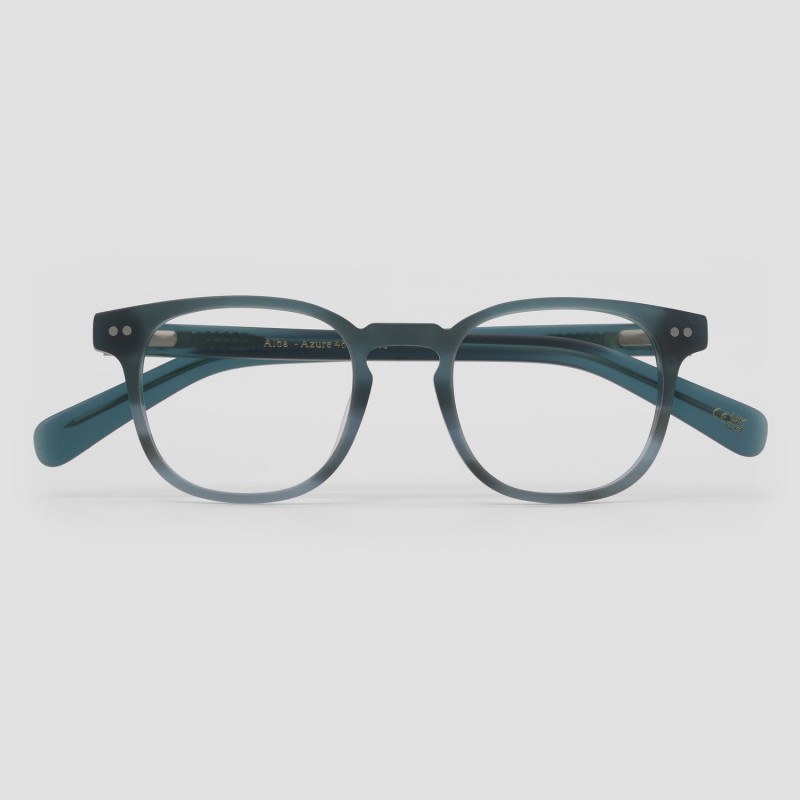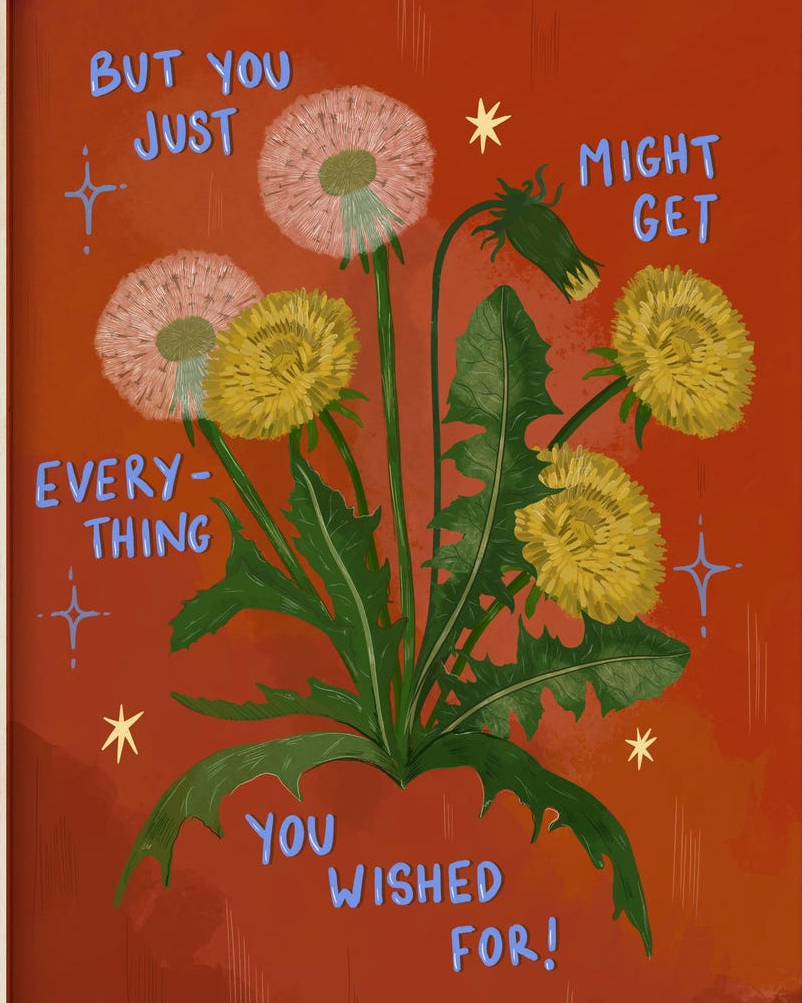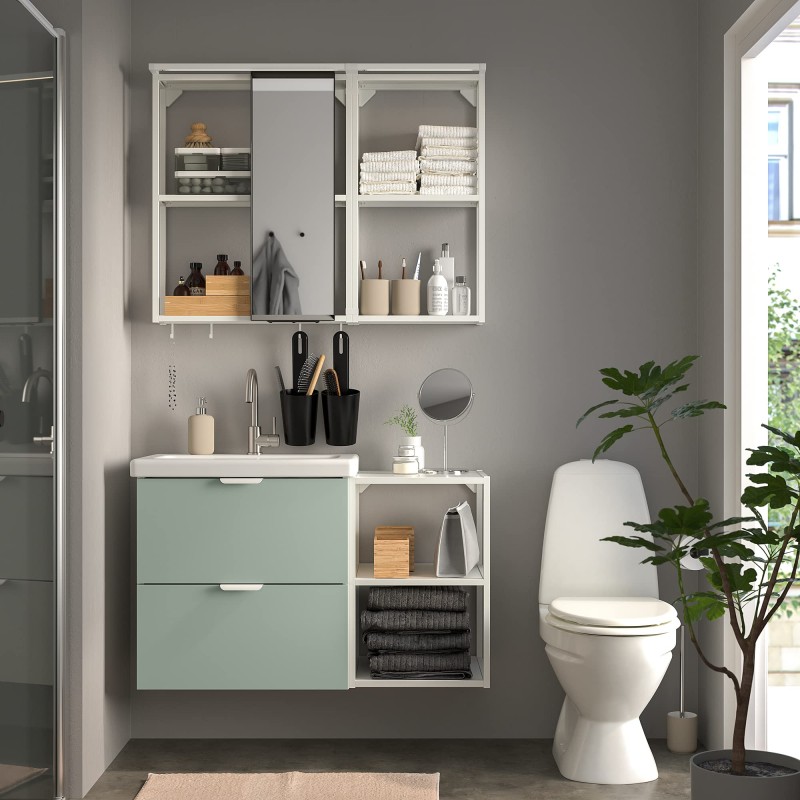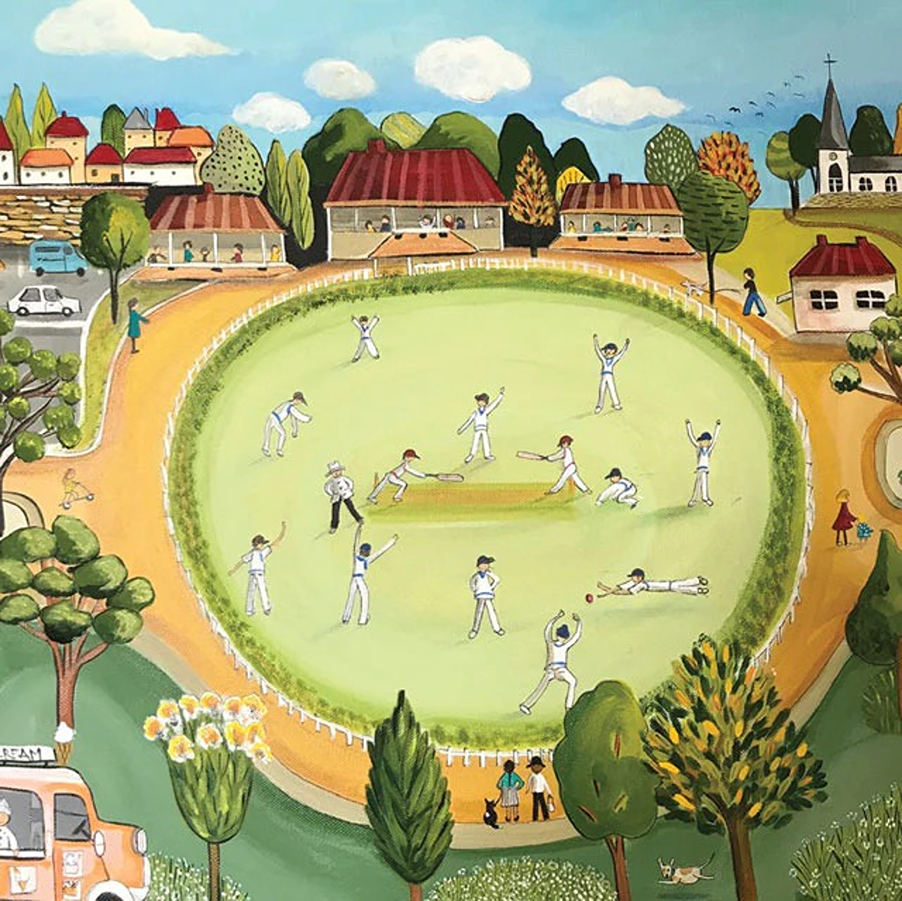Simple Swaps for a Zero Waste Office

Traditional sticky tapes again can’t be recycled, so invest in plastic-free packing tape, which you can also use in the office.
This adhesive paper tape is sold in a narrow size. Easily recycled, it’s made by a family business in Lancashire, also available in a floral design.
Avoid sending plantable gift wrap and cards to homes with pets, as most wildflowers are unsafe near animal friends. Read our post on keeping pets safe at Christmas.
Plastic-Free Washi Tape
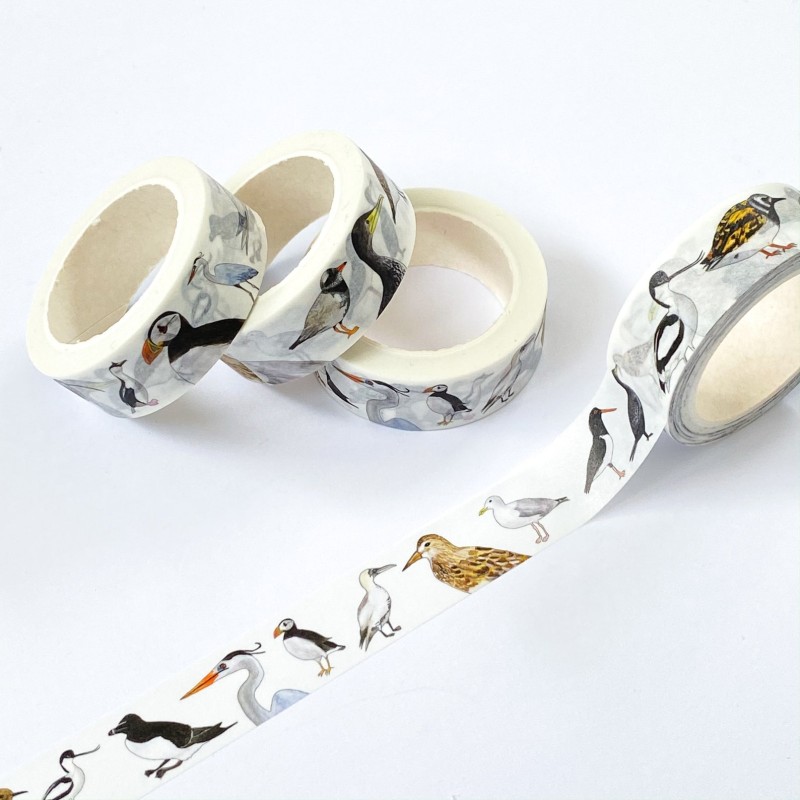
Sarah Frances Washi Tape is a more decorative option, made from easy-to-recycle paper adhesive.
Natural Twine and Ribbon
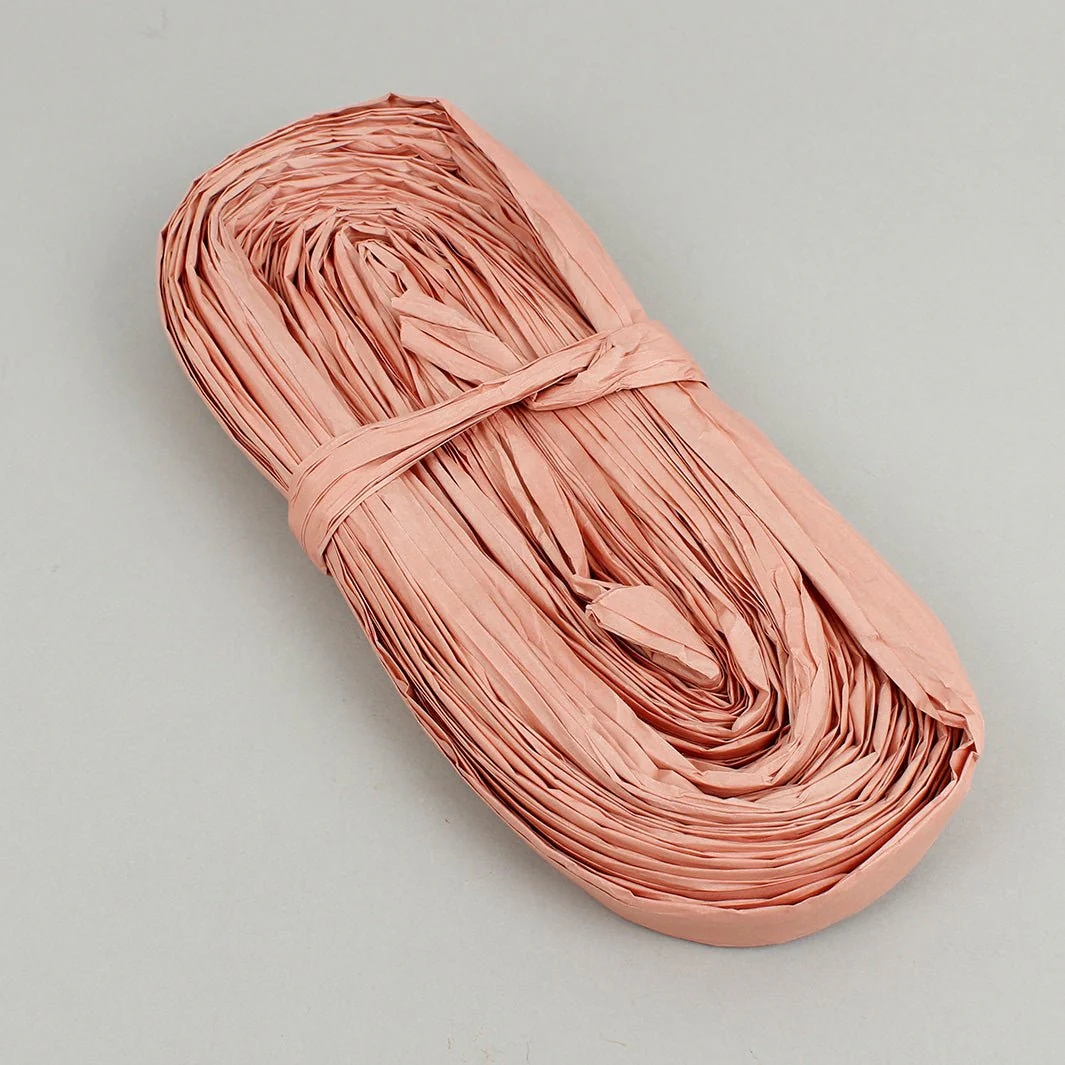
If choosing to wrap gifts with ribbon, choose biodegradable versions made from paper, or use natural twine that is easily chopped and composted, or breaks down naturally in the bin.
This thick and chunky paper ribbon is a much more eco-friendly and safer alternative to plastic ribbon, to wrap your gifts. And at end of use, you can just safely compost it.
Most ribbons and bows in shops are not just plastic, but often contain metallic plastic parts, that can pollute our waterways.
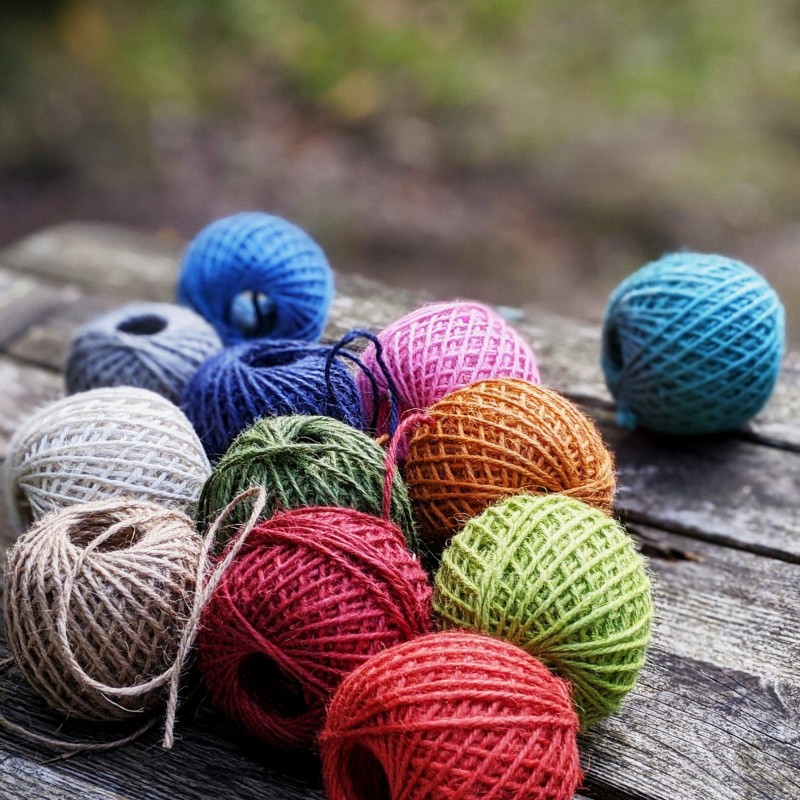
Or use natural twine, which is biodegradable, and adds a rustic charm. Just bin or recycle twine or string (don’t leave it in garden as it could harm wildlife).

England used to have a post office in every town and village, but that’s no longer the case. So for those remaining (even if it’s a kiosk in a local NISA store), supporting them is important. Not just for you, but for older and disabled residents who can’t go into town or online, to post letters or do their banking.
Local post offices (a bit like pubs and indie shops) keep communities connected. There are no massive national chains or self-checkouts here, you have to wait in queue, while the local older resident has her weekly natter with the post office clerk! As it should be.
Staff know regulars by name, and do far more than sell stamps and envelopes. And it’s nice to collect a parcel from a local post office, instead of an Amazon locker.
Many post offices also offer local banking services, imperative in places where bank branches (and even ATMs) have gone to the wall. You can use post offices to pay bills, top up utilities and even renew your driving license.
It would be safe to say that for some older people in isolated communities, it could be (aside from buying food) the only human friendly face that some people see all week).
Ask Royal Mail to Stop Using Rubber Bands

One real issue these days with Royal Mail is using red rubber bands to keep letters and parcels together. It’s not the postie’s fault, but inevitably millions are dropped, and trap around hedgehog legs, or birds feed them to chicks, thinking they are worms.
One man found a red rubber band in his cat’s litter tray, and says (just like us), Royal Mail should be fined for littering. They also can wash down storm drains, and go into the sea.
A far better alternative is to swap the rubber bands for paper belly bands, which would be far less harmful to wildlife. If you see any, take them home and snip them up, then bin securely.
There is no point Royal Mail promoting sustainable packaging and recycling, if they continue to use red rubber bands on our streets.
Use Envelope Reuse Labels
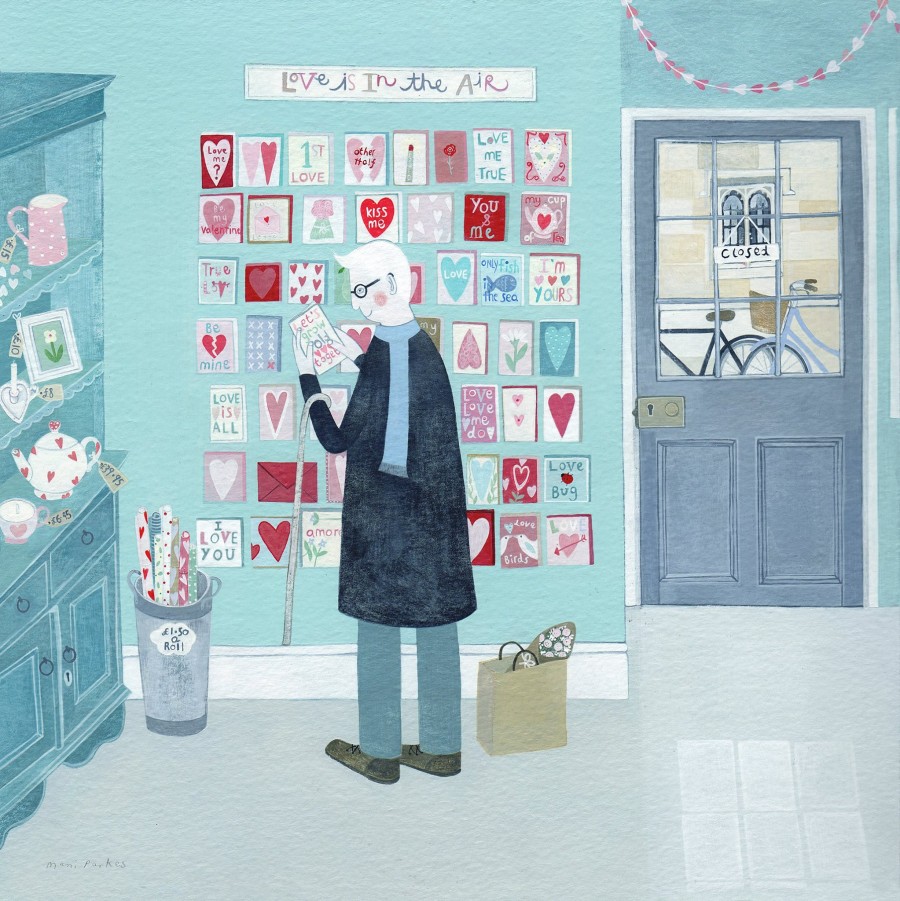
Rather than buy new envelopes in plastic packaging, invest in a set of envelope reuse labels. These are simply slapped on existing envelopes, to reuse them. They are particularly good for business, as it looks more professional than just scribbling over old addresses.
You can buy envelope reuse labels that promote great causes, and use profits to help hedgehog rescue and humane research.
You can tear off old stamps (leave a small margin) and pop in an A5 envelope (with broken jewellery and old coins) and send off to raise cash for favourite charities. Order a free sack for large collections.
Using envelope stickers is good for the planet, but of course also saves you money.
If sending greetings cards, don’t send ‘plantable’ ones to homes with pets, as many grow into toxic wildflowers).
If you use internal mail (or send mail to the same people again and again), it’s worth investing in Australia’s Lopees. This one-time purchase sends organic cotton reusable envelopes (including book bags) that you can use forever.
How to Stop (nearly) All Junk Mail
Nearly everyone does not want junk mail. But the 2% of people who do reply, means the industry continues to send around one tree’s worth of unwanted mail to people each year. And this includes glittery paper that is not easy to recycle (you can recycle window envelopes, machines can separate them).
Never send glossy leaflets through the post (one dog behind the door almost died, from licking the glue).
Citizens Advice has a good post on all the places to register with (Royal Mail, mailing preference services) etc to avoid receiving junk mail from registered companies).
Councils and police forces can join the Think Jessica campaign, to help stop scam mail to vulnerable people (international lotteries, talismans etc).
This campaign wants the law changed, so that posties (often the only people aware) can alert someone, if recipients are receiving hundreds of mailings demanding money.
Another good thing to do if you get a lot of junk mail is to get out a notebook and make up a middle initial! So each time you have to fill in any information, use a different one:
- Mr A A Carpenter
- Mr A B Carpenter
- Mr A C Carpenter
Etc. Then if you start getting junk mail, you should be able to see pretty easily where your name was sold on, and ask them to stop.
Switch to Paper Packaging Tape

Paper tape secures packages without plastic. Made with natural adhesives, it’s strong and seals boxes tight. When it’s time to dispose of the box, you can recycle everything in one go.
Paper tape holds up well during shipping and looks smart and neat. It’s a small change that helps avoid microplastics and supports full recyclability.
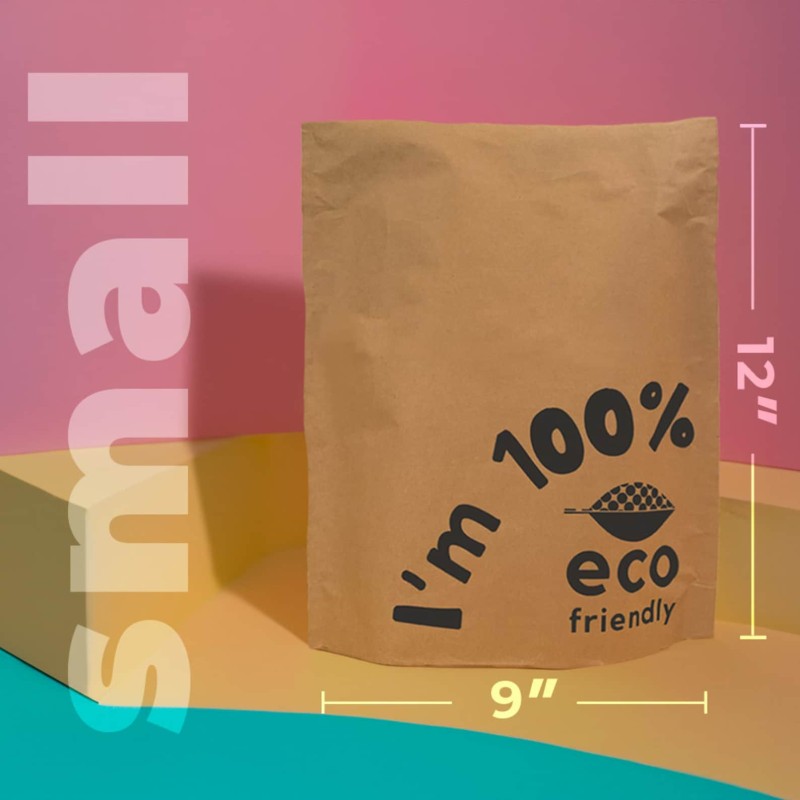
FSC-certified mailer bags are sold in packs of 1 to 50, the company also sells mailing paper sacks for larger items and board back envelopes.
Eco Packaging Ideas for Fragile Items
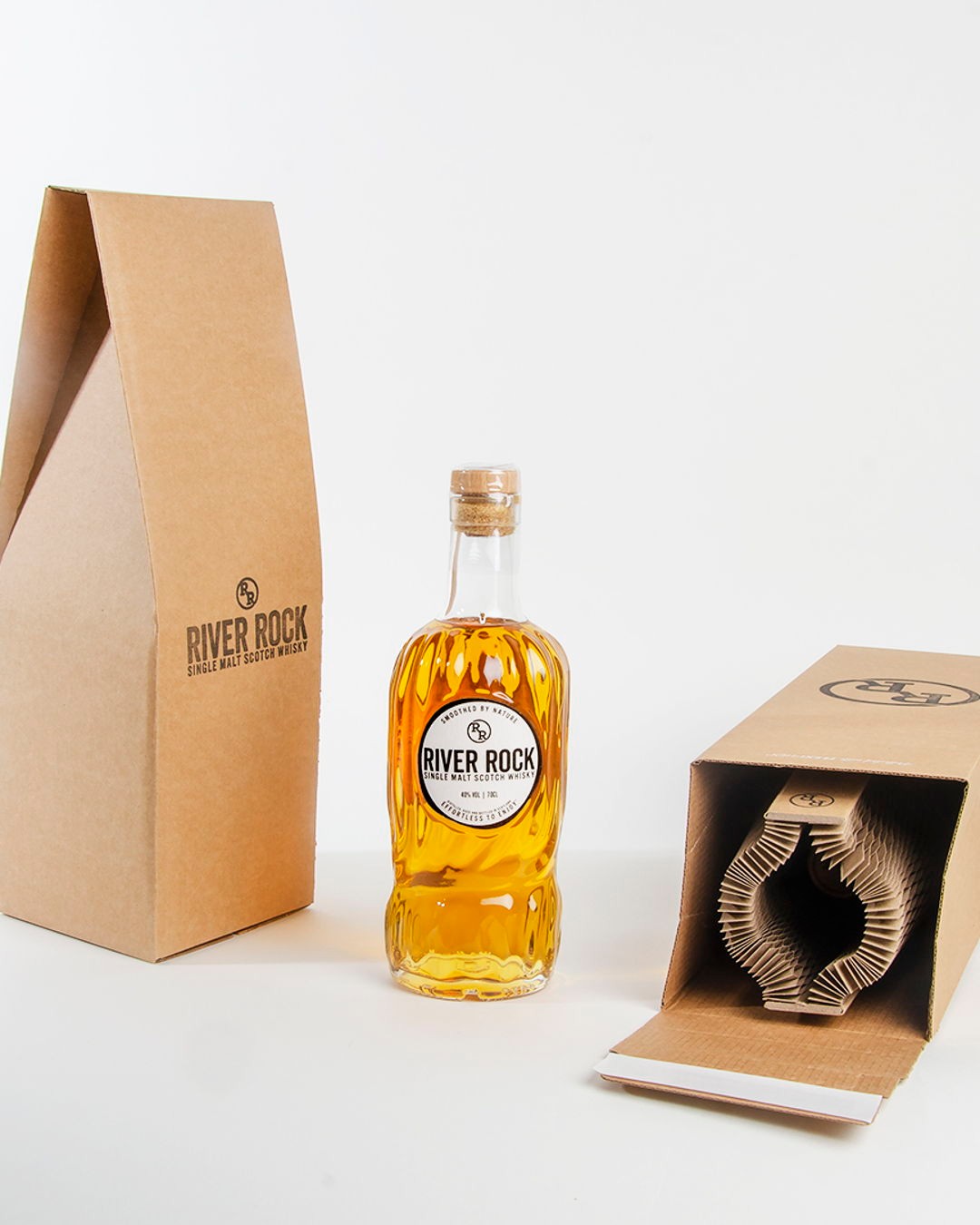
If you have to send delicate items through the post, you no longer have to wrap everything in plastic bubble wrap. It may be great fun to ‘pop’ it, but it’s terrible for the planet. You can now find companies offering biodegradable cornstarch peanuts that biodegrade instead.

The best solution is usually corrugated cardboard, which is made from layers of recycled paper, so fits snugly around fragile items to reduce movement, and force from impact.
Flexi-Hex uses a hexagonal design, made with 85% recycled cardboard and water adhesives. Sold both retail and wholesale, it fits bottles to spectacles, there are even versions to send surfboards! This company is DPD-approved.
Kiriboard: Recycled Cardboard Plastic-Free Packaging
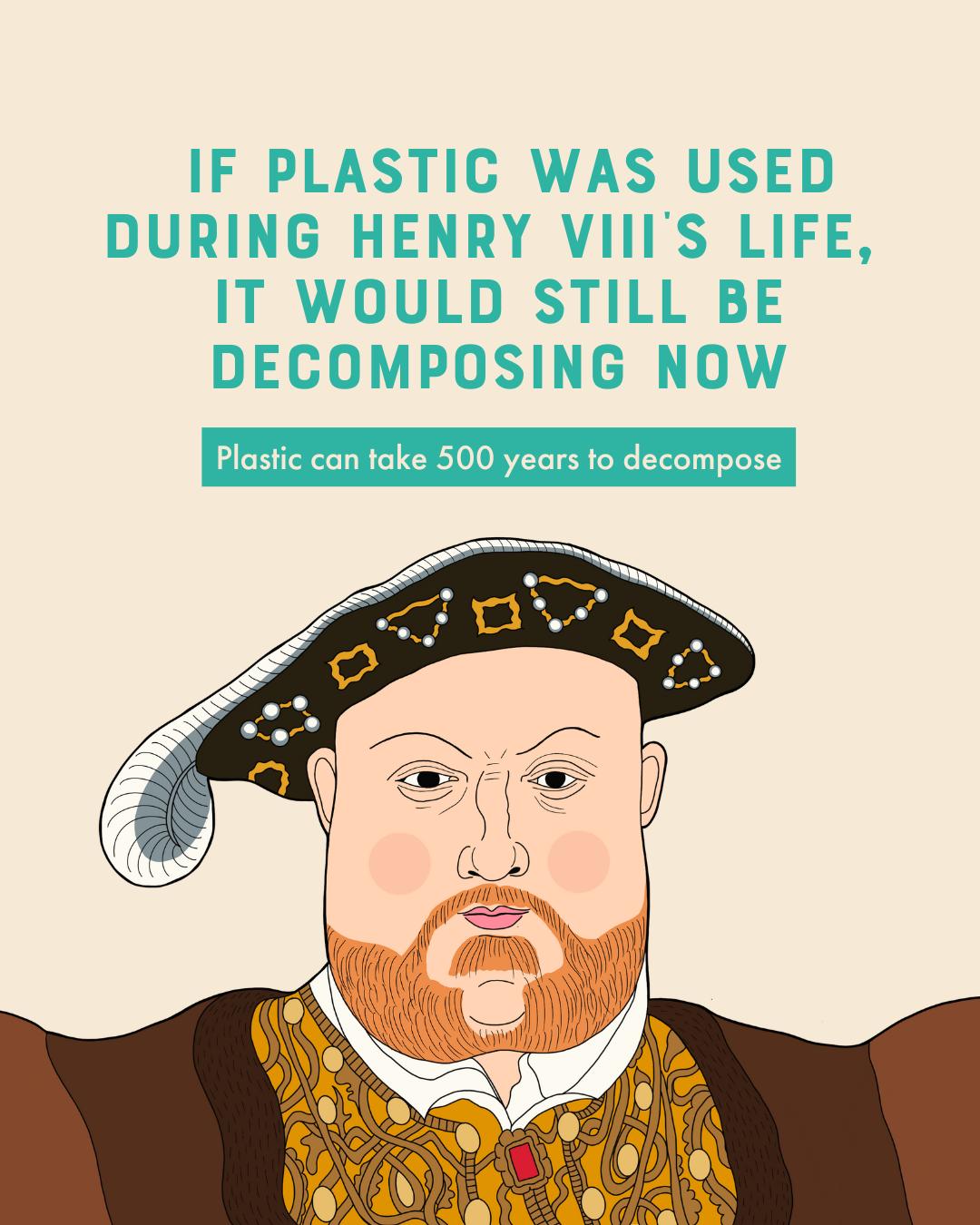
Kiriboard is an exciting alternative to plastic-free packaging, invented by three New York teenagers! Inspired by the Japanese art of folding paper, they created it, when a box of motors for their robotics hobby arrived damaged.
There’s something wonderful about three nerdy teenage boys inventing something to make their hobby work, which could save the planet! This invention has won the Earth Prize 2025 (there are lots more amazing inventions), and there is hope that the new packaging could be used by Amazon, Home Depot and the postal service, to replace the colossal amount of plastic being used for commercial purposes.
Kiriboard is cut into lattice-like shape (just like an apple pie topping) so it can bend to fill the space between an item, to absorb impact and protect just like bubble wrap but without plastic. Using recycled cardboard is biodegradable, whereas plastic is made from oil (so supports the fossil fuel industry and takes over 500 years to biodegrade, releasing microplastics into seas and rivers).
Where to Recycle Plastic Bubble Wrap
You can recycle bubble wrap (LDPE) at supermarket bag recycling bins. For a big office clear-out, order a Terracycle shipping materials box (costs £100 to £400 depending on size).
Towns and villages can split the cost, to get all plastic supplies out of town for good, never to return. Just order a box, fill up at a drop-off point and send back using the prepaid shipping label. Items are made into things like industrial piping and park benches.
You can use the box to recycle plastic mailers along with bubble/stretch wrap, packing foam, plastic tape dispensers, shipping peanuts and deflated air cushions. You can’t recycle padded envelopes, laminated paper or hazardous waste.
Bike Delivery (for posting parcels)
If you run a local business, considering using bicycle delivery services (rather than big van companies) to post local parcels. Examples are Three Bags Full (Bath) and Pedal & Post (Oxford) use bike delivery (the latter combines with trains for intercity).
It takes longer to post letters abroad, due to snow or mountains. In Chile, some letters take so long to get there due to the Andes, that people often just take the bus to deliver in person!
What was the Post Office Scandal About?
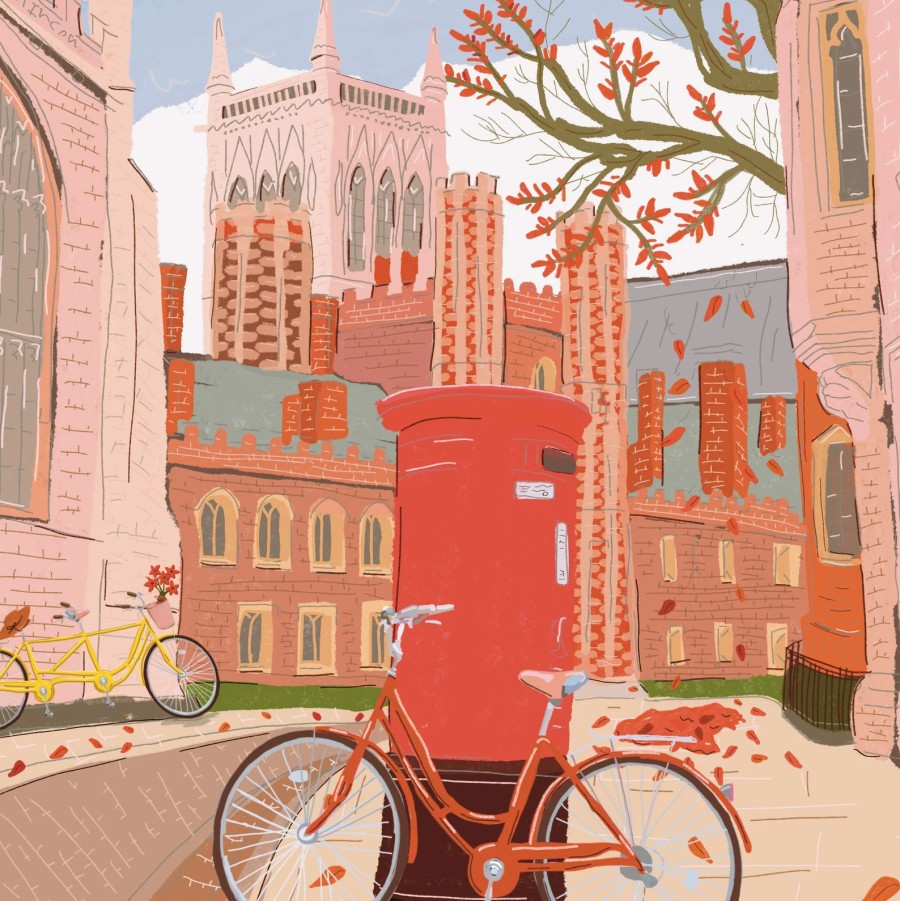
You’ve likely heard on the news (or watched the film) about the recent Post Office scandal, which has tarred the reputation of our national post office.
Thankfully the victims are hopefully to be financially compensated. But many have been left with mental health problems, and some have died since, so will not see justice.
The Post Office scandal stands as one of the biggest miscarriages of justice in recent British history. It affected hundreds of sub-postmasters and postmistresses, costing them their jobs, reputations, and in some cases, their freedom.
In the late 1990s, a flawed accounting system led to users reporting shortfalls they could not explain. Rather than trusting staff, the Post Office relied on the system data, and believing a computer over people led to over 700 sub-postmasters and postmistresses (over 20 years) faced accusations of theft, fraud, and false accounting. Many were prosecuted, and some lost their jobs, homes and life savings.
Several went to prison, while others died before their names could be cleared. There were suicides linked to the shame and pressure brought by the accusations. Yet, for years, the Post Office refused to accept any fault, blaming individuals for what the IT system had caused.
In 2019, Mr Bates and others took action, and after a long legal battle, a High Court judgement found that the Horizon system was flawed and unreliable.
The case is now taught as an example of what happens when large companies ignore the real-world impact of their systems on people’s lives.
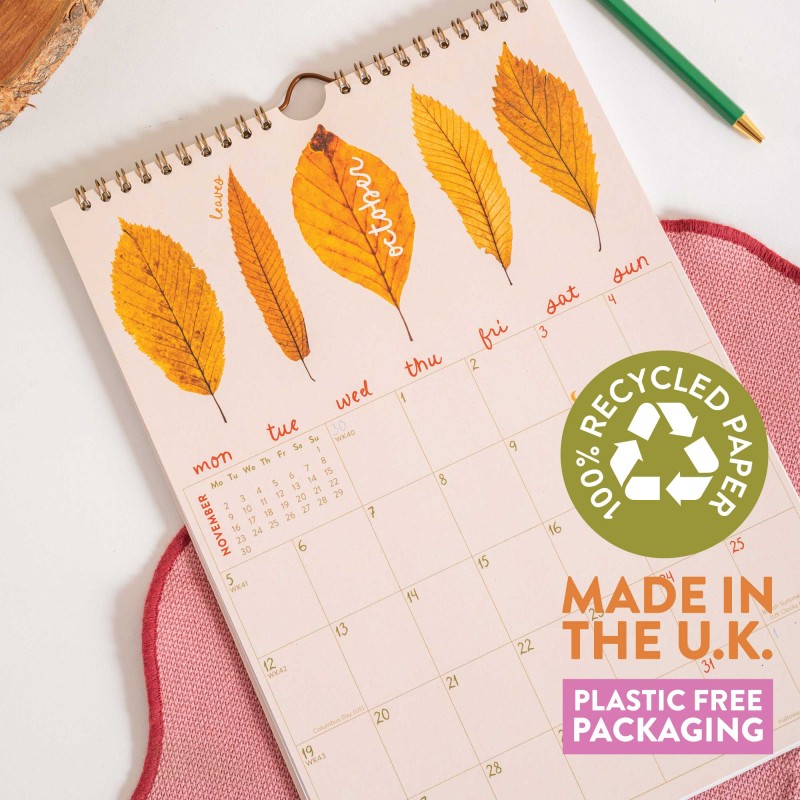
GoodTuesday is a wonderful company that makes notebooks, gift wrap and all kinds of calendars and notebooks made from recycled paper, sent in plastic-free packaging. You can even write on them using the brand’s recycled pens!
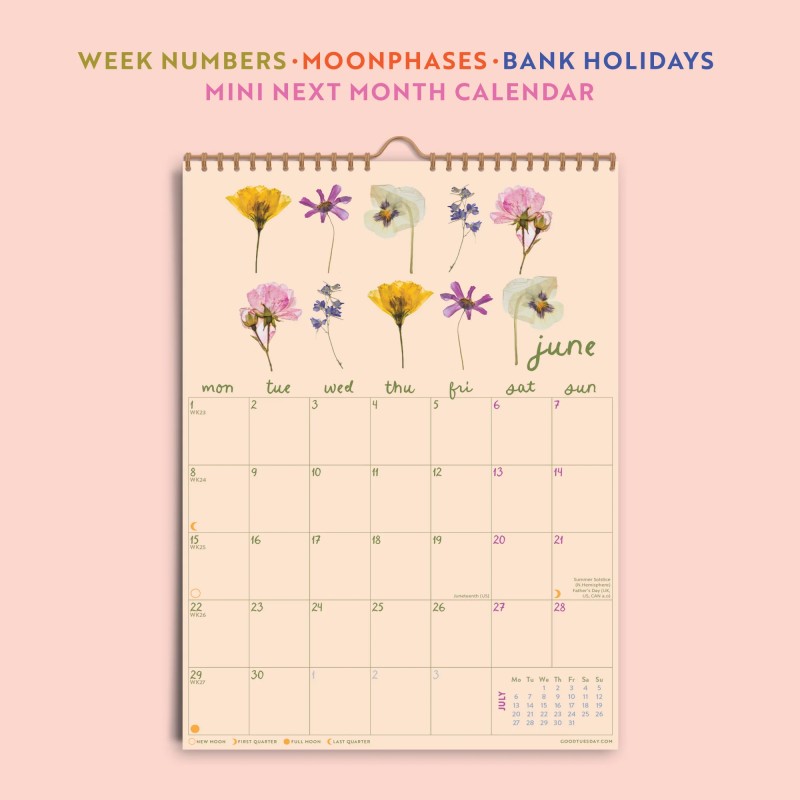
Here are their latest creations, to make 2026 your greenest year ever! You can even buy add-on biodegradable stickers, to mark important dates.
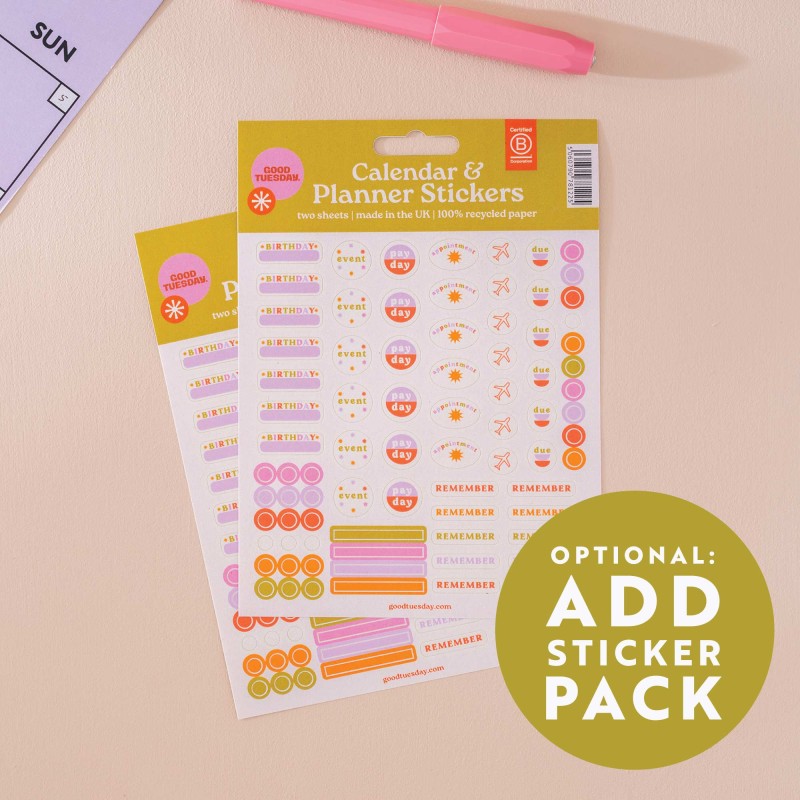
There are giant wall planners for your kitchen or office:
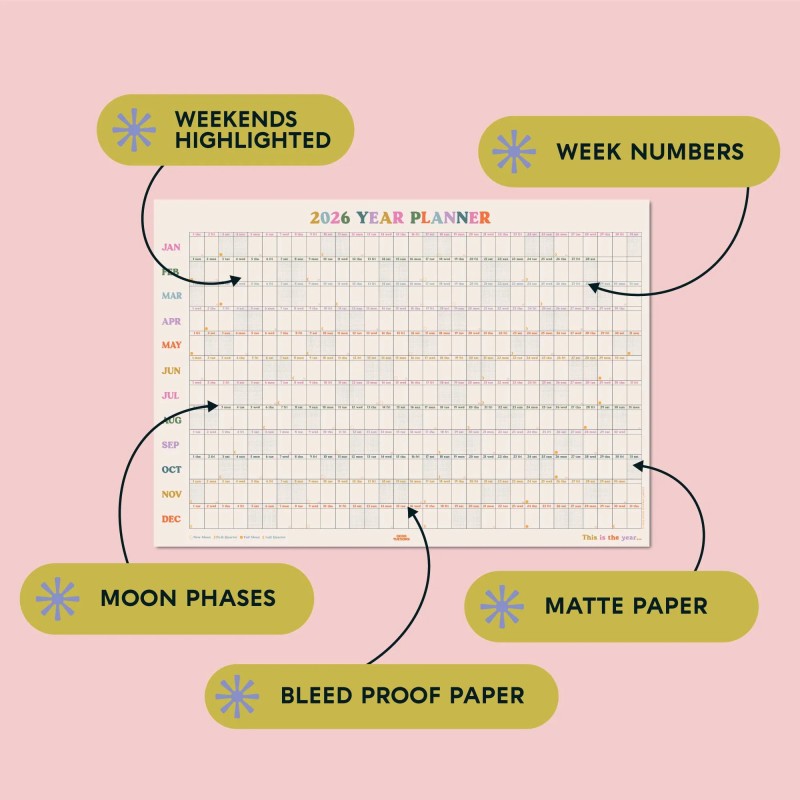
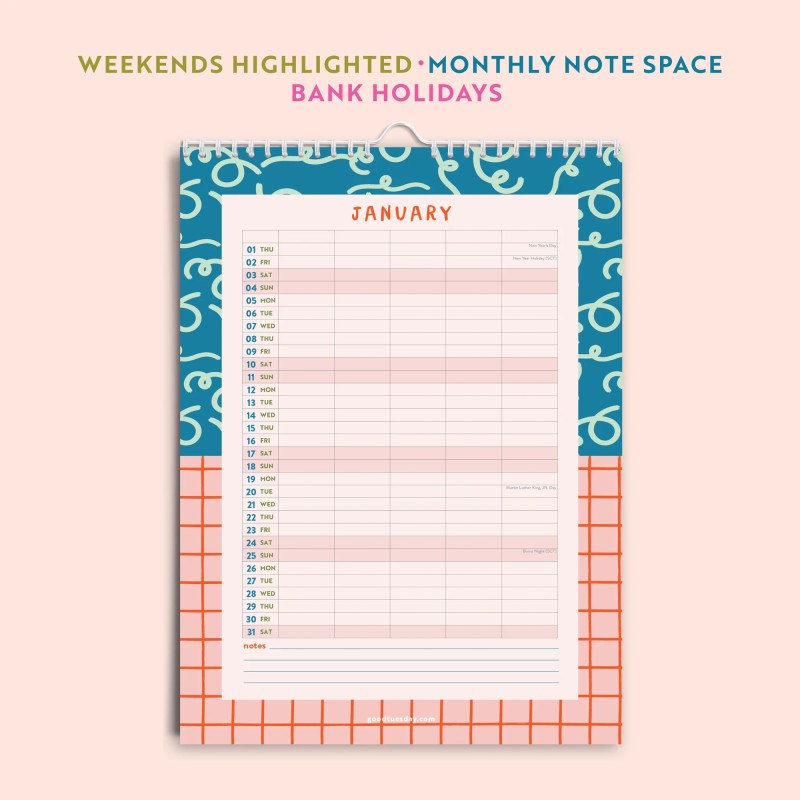
Or if you prefer a calendar on a smaller calendar, they offer beautiful desk calendars.
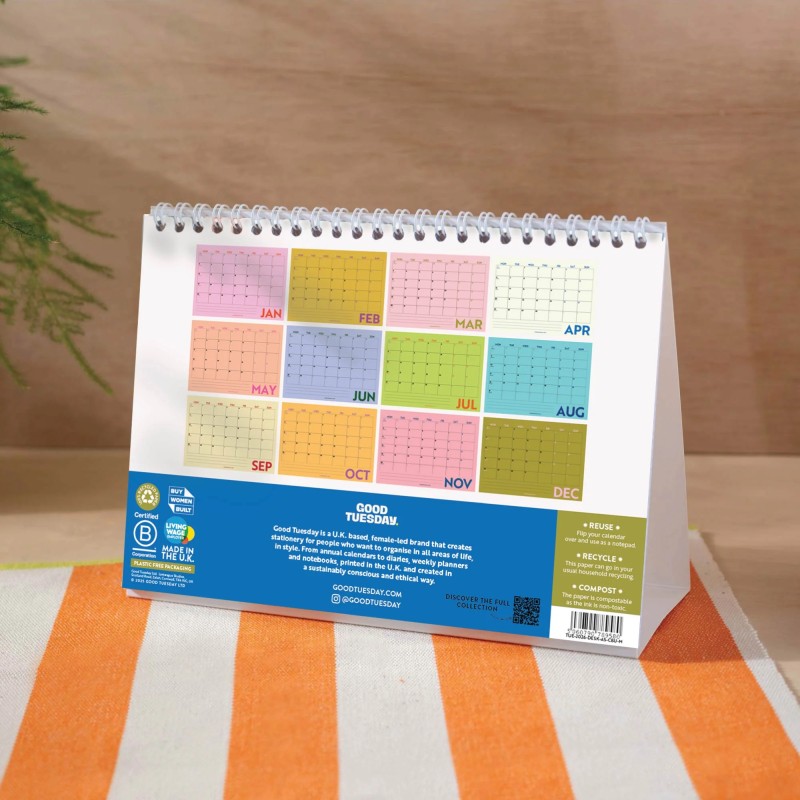
And even couples calendars, so you can write on each side, if you’re doing different things!
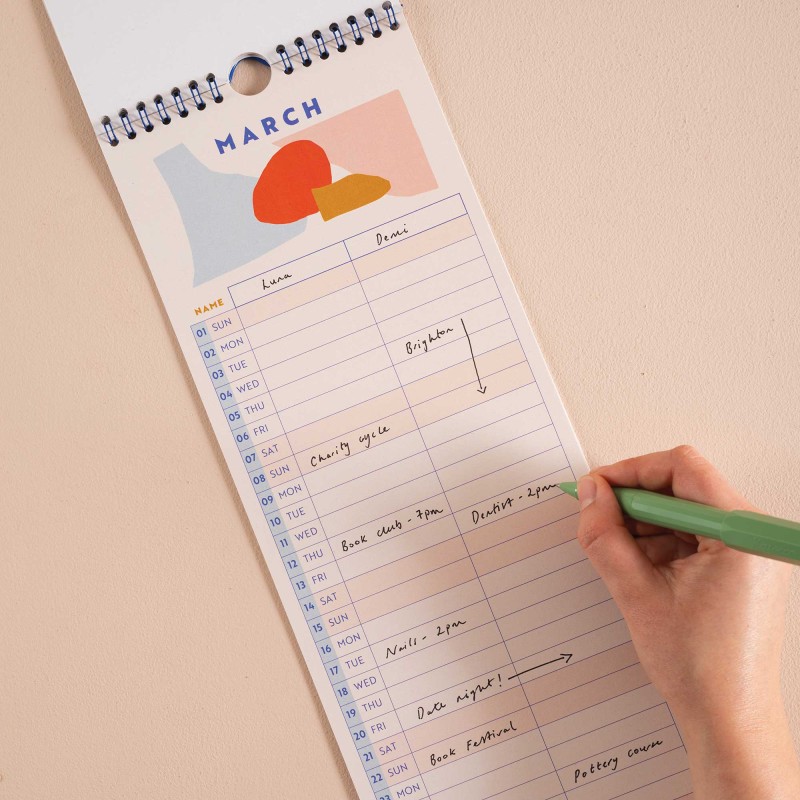
2026 Recycled Diaries
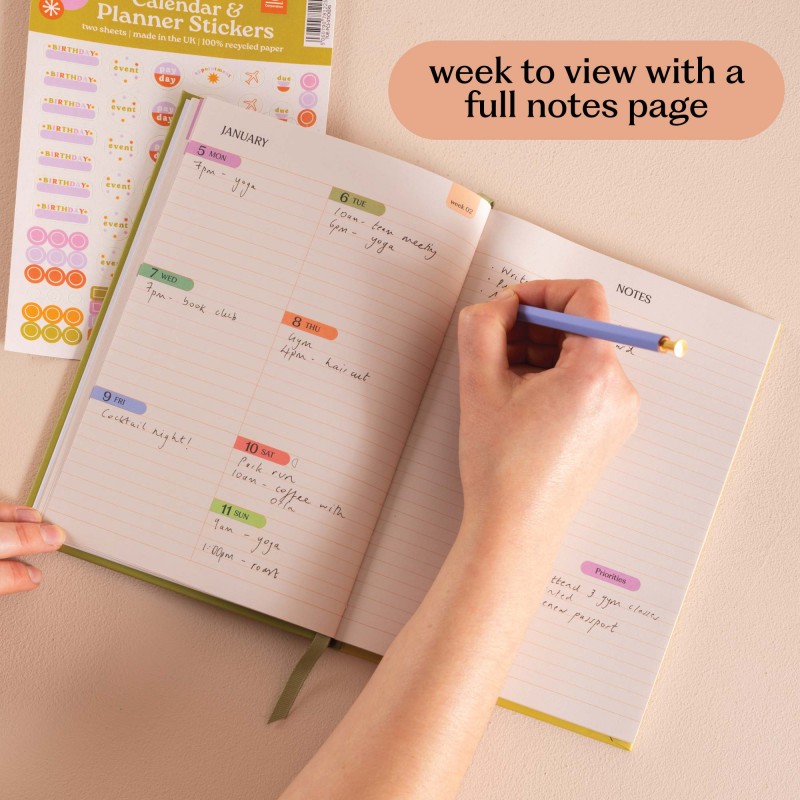
There are beautiful diaries, also printed on recycled paper.
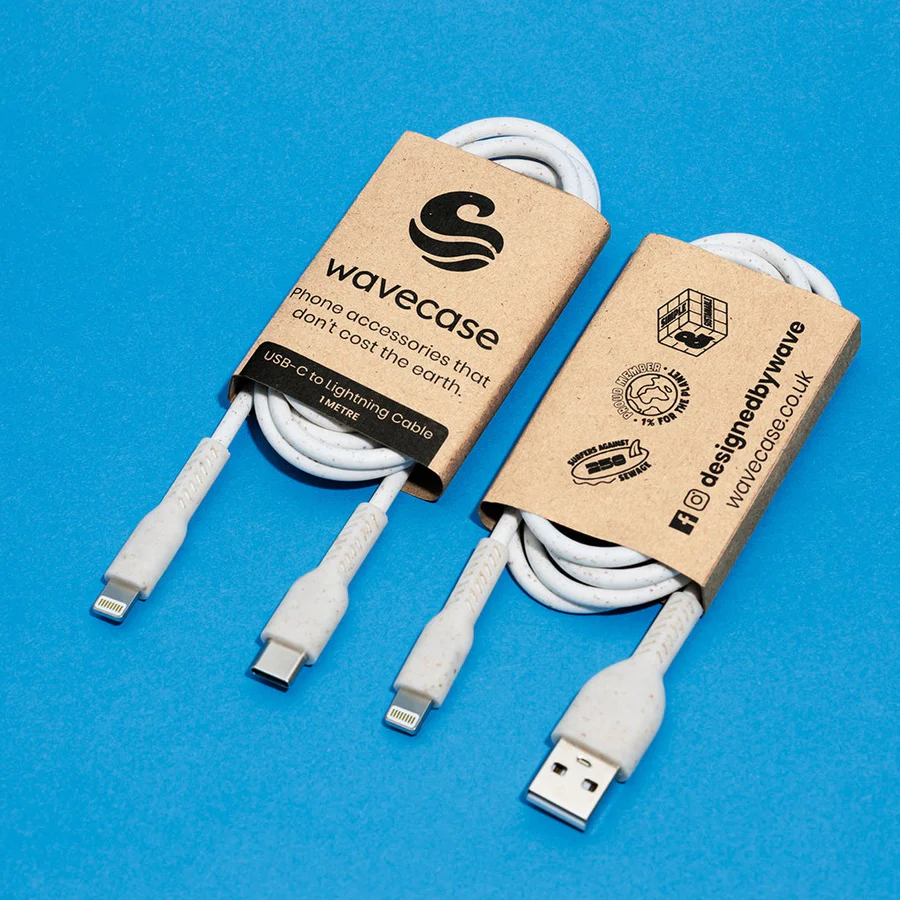
These bio-based charging cables have exteriors made from plant-based materials, sold in an easy-to-recycle paper sleeve. Engineered with lightning-fast data transfer speeds, so you don’t compromise on performance.
Check devices before choosing a charger, and never overload sockets.
recable is a German company that makes zero waste charging cables and other devices. Made with vegan conflict-free materials (and wrapped in a paper belly band), they are easy to recycle, and lovingly handmade to fast-charge your smartphone. In pretty colours, they have almost half the carbon footprint of conventional cables.
Due to adapters being glued by others, their manufacturer can’t provide precise info if lightning cable glue used is vegan (it may be, they are trying to find out). All other items are vegan.
Gomi Power Banks (made from plastic bags!)

Gomi Power Bank is handmade in Brighton from recycled plastic bags, and is also easy to repair. It holds enough power to recharge your phone up to three times, and also uses second-life batteries for durable but eco-friendly power.
It’s sold alongside USB-A and USB-C fast charging ports. Sold in a zero waste case too.
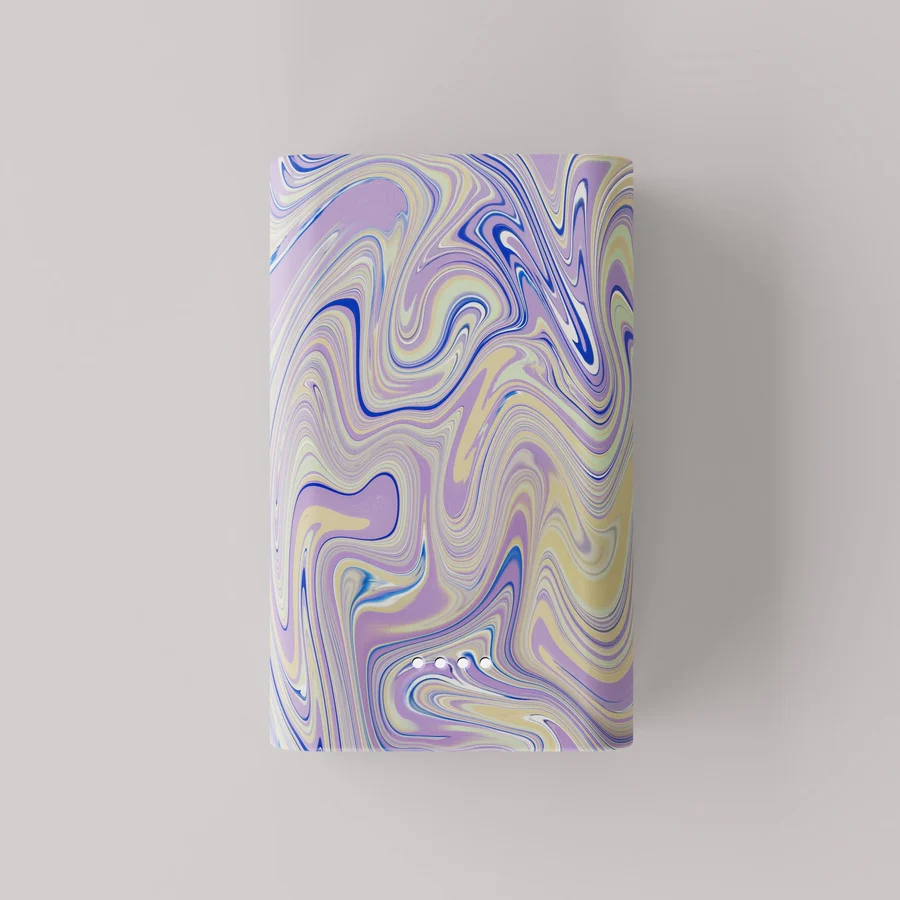
Designed to be repaired by you in just 10 minutes, it can charge your phone up to 3 times, and charge 2 devices at once (due to USB-A and USB-C ports).
It’s also lightweight and sleek, easy to fit into your pocket. This unique company also makes sound speakers from the same recycled materials.
This charger offers over 50% fewer carbon emissions than repairable chargers. The charger can even charge up to two devices at the same time, and yet is a portable size, to carry with you, when you’re out and about.

Good Tuesday (a company which makes recycled paper notepads) also sells nice refillable pens to use them with.
Writing Pen Safety Tips
Keep pens & pencils away from young children & pets. Avoid gifting plantable pens to homes with pets, as many contain wildflowers or herbs that are not safe near animal friends. Learn more on pet-friendly gardens.
Kaweko Perkeo Rollerball Pen

Kaweko Perkeo Rollerball Pen is an affordable and stylish pen in several colour choices. It offers smooth writing, and a 16-sided barrel to prevent the pen from rolling, and uses international standard rollerball refills, meaning it will last you years.
The snap-on cap securely closes to protect the tip and prevent ink from drying out. The grip section is designed for comfort, and slightly textured for a firm hold.
Gel Ballpoint Pens

The Gel Ballpoint Pens have a 0.5mm tip for smooth writing with black ink. Made in Japan from wood with a metal mechanism, this pen is also refillable.
Why Choose Eco-Friendly Writing Pens?
Each day, millions of plastic writing pens end up in landfills, polluting soil and water. Plastic also requires fossil fuels to make, and produces greenhouse gases.
Most pens are also sold in plastic packaging (often in quantities more than needed (like packs of 10, when you only need one or two usually).
Where to Recycle Plastic Pens and Pencils
Terracycle offers a free writing instruments recycling programme, sponsored by industry. Just order a box for your office, school or community then everyone can deposit unwanted pens, pencils, highlighters, correction fluids, felt-tips pens and erasers.
You can also download a poster to display near the recycling box, and all items are sent off to be made into other things (like park benches).
A Pack of Eco-Friendly Ballpoint Pens
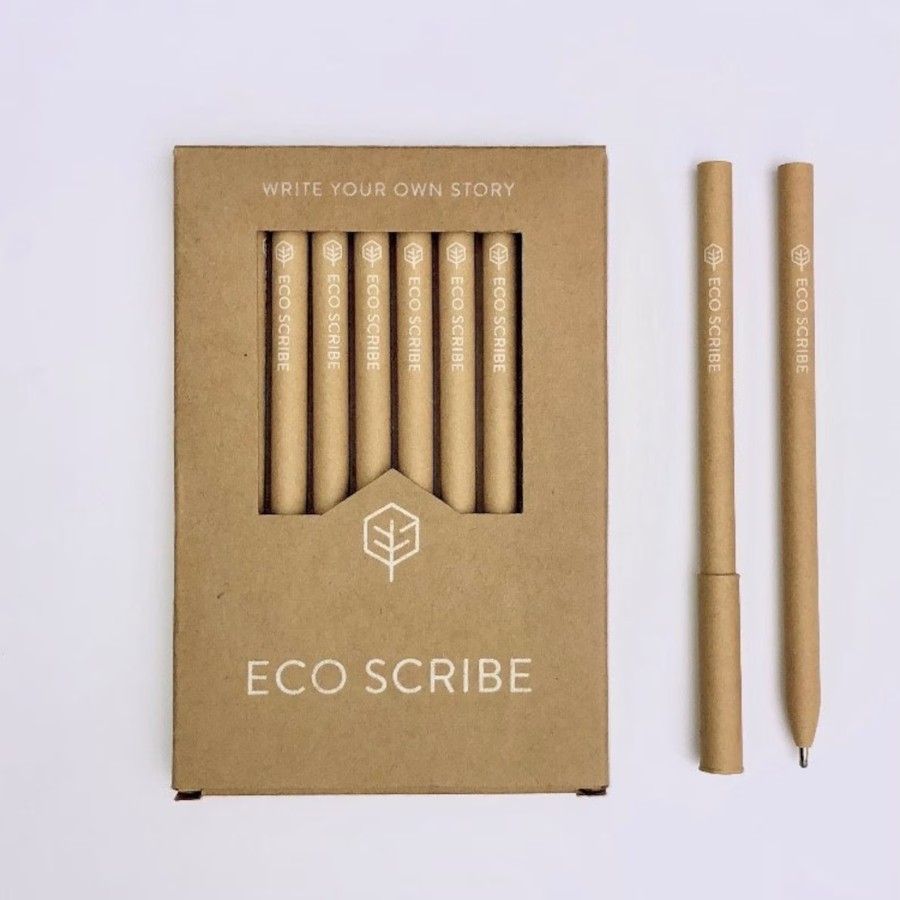
This pack of eco-friendly ballpoint pens are made from recycled paper, with medium nibs and comfortable non-slip grip and a smooth even flow writing experience. Sold in a pack of 10 with black ink, the pens are also easy to recycle.
At end of use, just soak the pen in hot water for around 2 minutes. Unravel the paper shaft, remove the stainless steel ink chamber, and recycle all the parts appropriately. Each pen is tightly hand-rolled down to the nib.
Tom’s Studio (Refillable Fountain Pens)

Fountain pens have moved on from the ones that required fiddly ink pots that leaked down your shirt.
Tom’s Studio was founded by a craftsman who after watching his wife use a plastic mass-produced calligraphy pen, did not feel it matched the quality of her beautiful work. A former furniture designer, he decided to create something better.
The Fountain pens have 6 interchangeable nibs, a reassuring weight and a clever cap design, for a lighter more comfortable writing experience. The Shimmer Inks are all nontoxic and vegan-friendly.
If you do leak ink on your shirt, immediately cover with a little salt and dab with a wet paper towel, then brush until the stain disappears.
If that doesn’t work, blot the stain and soak with a sponge and a little rubbing alcohol for 15 minutes. If that doesn’t work, mix cool water with oxygen bleach and soak for 8 hours, before laundering.

Lumos Pro (refillable fineliner)


Lumos Pro is a beautiful refillable fineliner, with brush pen, 2 writing tips and 9 artist’s tips.
Tom’s Studio has recently also released some exciting zero waste writing implements:
The Wren Refillable Writing Pen
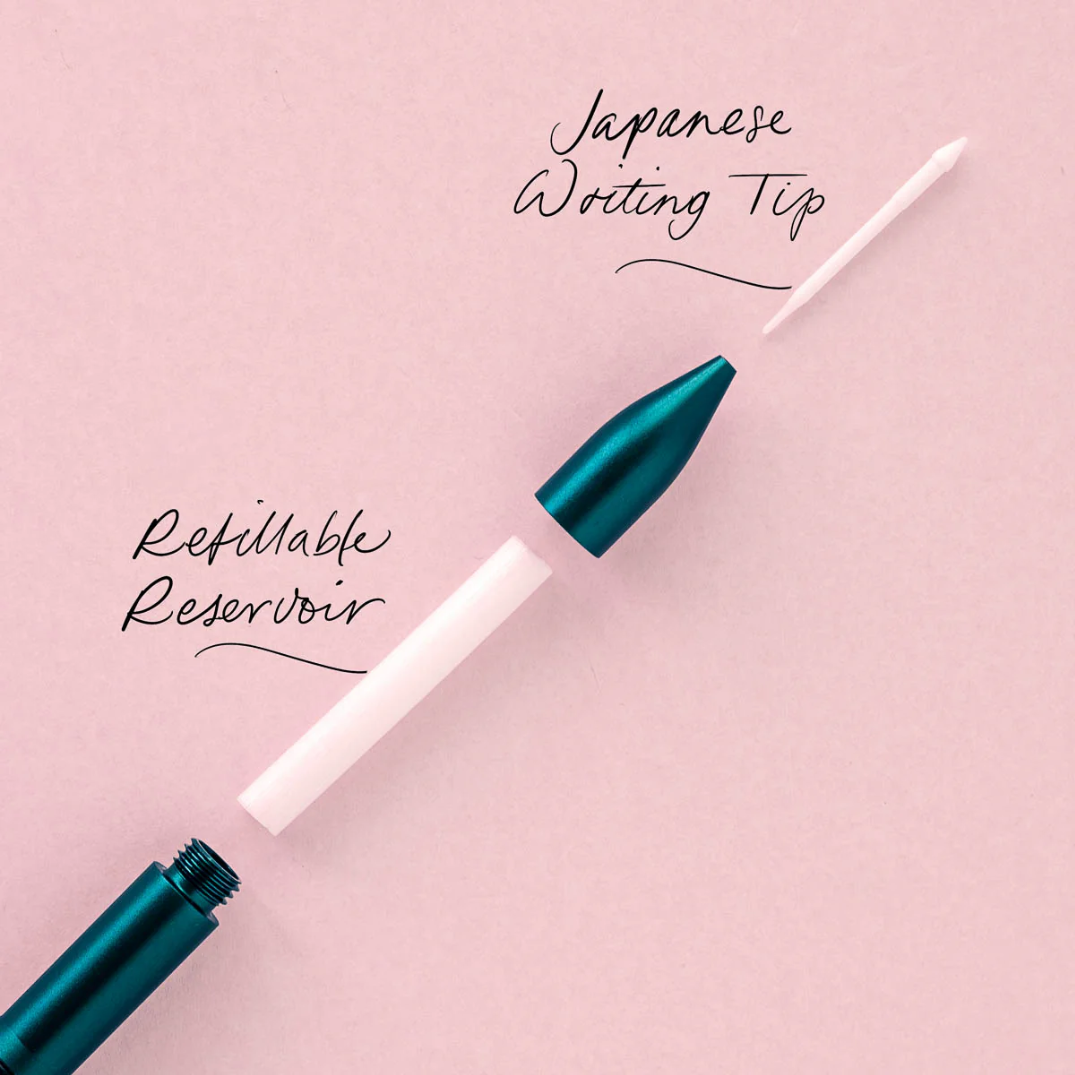
The Wren refillable writing pen, with a Japanese writing tip.
Wren Write-off (made from discarded pens)
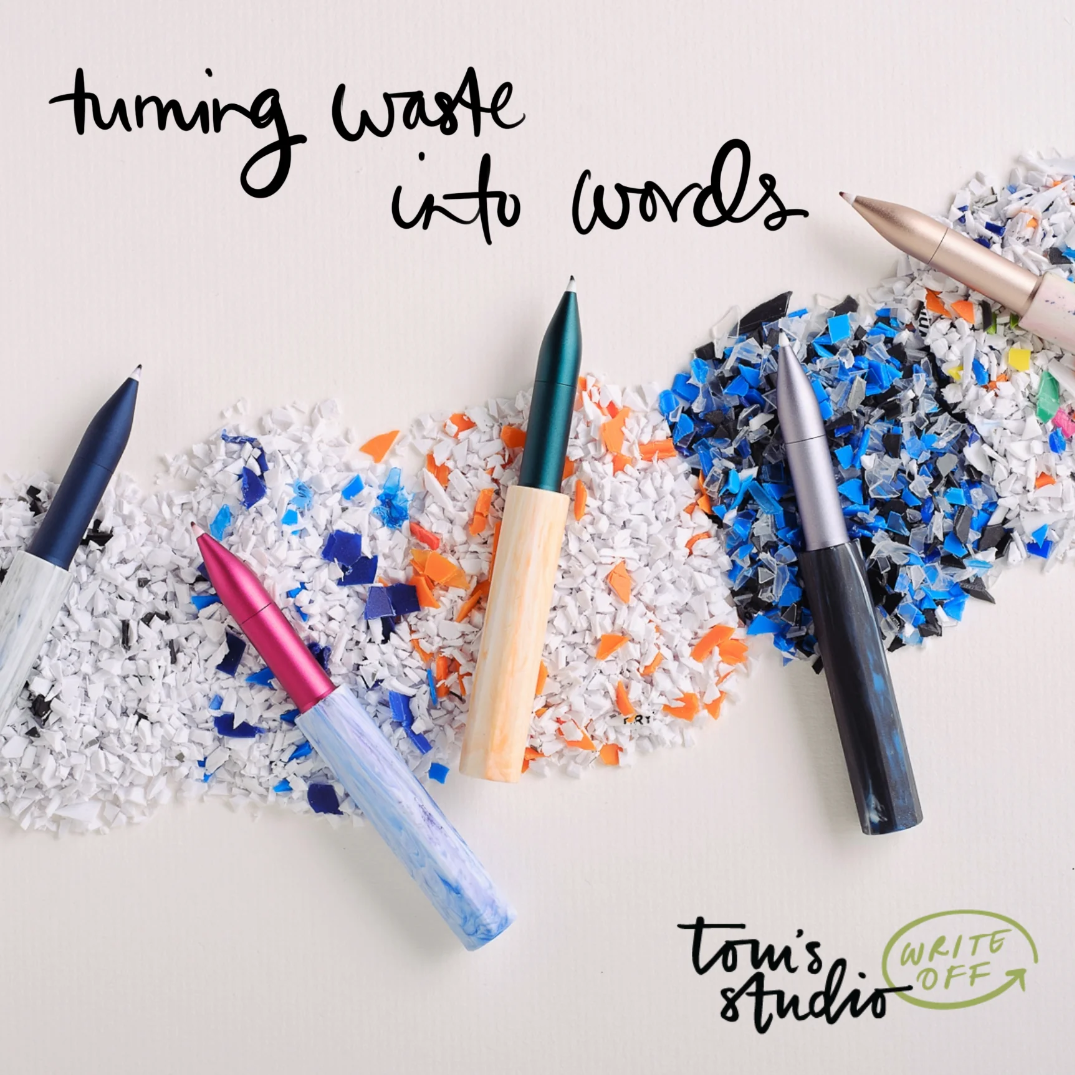
And the Wren Write-Off (made from discarded disposable pens).

Good Tuesday makes beautiful organised notebooks, made with post-consumer recycled paper, and sent in plastic-free packaging. The books are also designed to open, and lay flat. There are even theme-related notebooks like this one for ‘notes from the garden’.
Read our posts on pet-friendly gardens and wildlife-friendly gardens. Also how to stop birds flying into windows.

Why Choose Recycled Paper Notebooks?
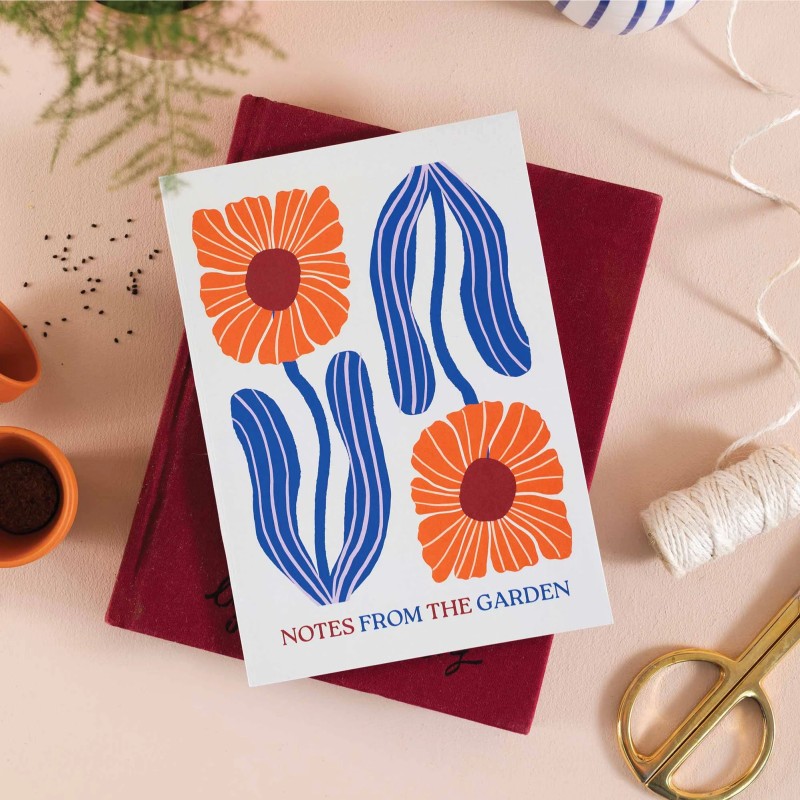
Although most virgin paper is FSC-certified, ‘sustainable forests’ often mean old-growth trees are chopped down (which provide homes for wildlife) and replaced by fast-growing saplings that are grown with toxic pesticides. Some of this paper is also bleached with chlorine, which pollutes waterways and harms wildlife.
Creating paper from old paper is a great way to close the loop, and also uses less water and energy. It also helps to save our forests, and all the creatures that live within them.
Recycling 1 tonne of paper saves 17 trees and 26,000 litres of water. And also cuts up to 74% air pollution and reduces methane emissions at landfills.
Office Note Books (made from elephant dung!)
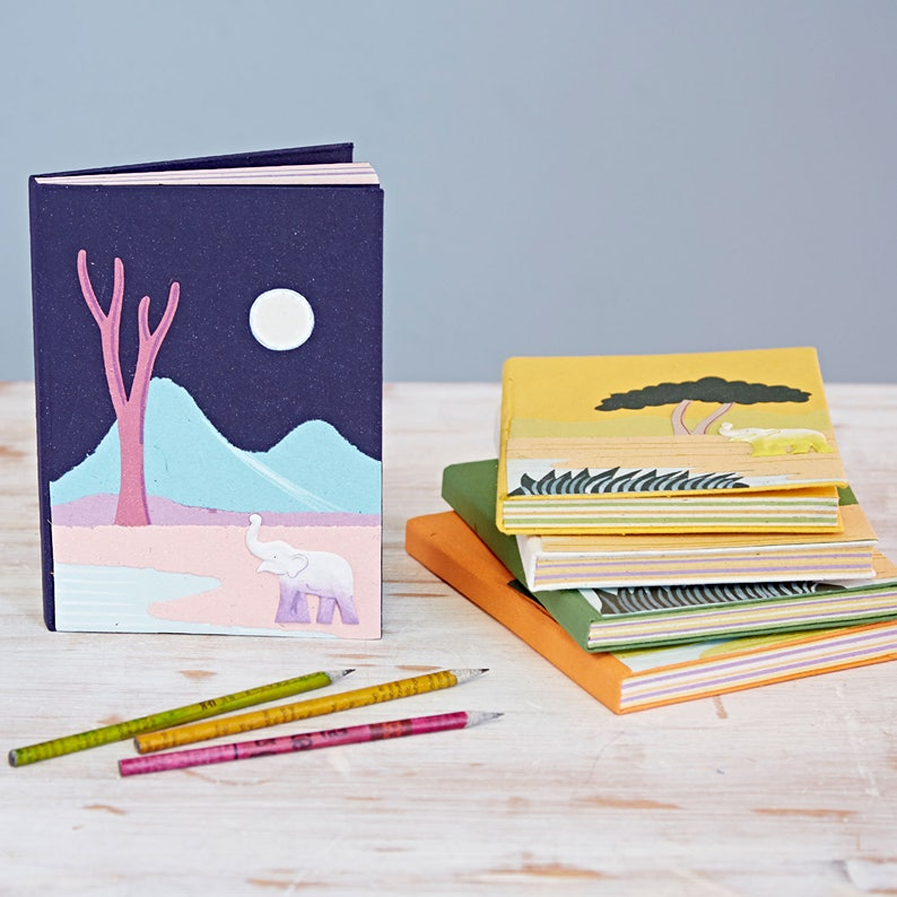
Paper High sells these beautiful notebooks with a difference. They are made from a blend of recycled paper and elephant dung! Read more on how to save critically endangered elephants. Use with plastic-free ballpoint biros.
These note books have a serious side. Abroad, wild elephants are often harmed, due to trampling on crops. So by paying local villagers to collect the dung, they see elephants as income opportunities (and friends) rather than competing for food.
You are also helping to provide income for a mostly female team of artisans in Sri Lanka who produce the notebooks.
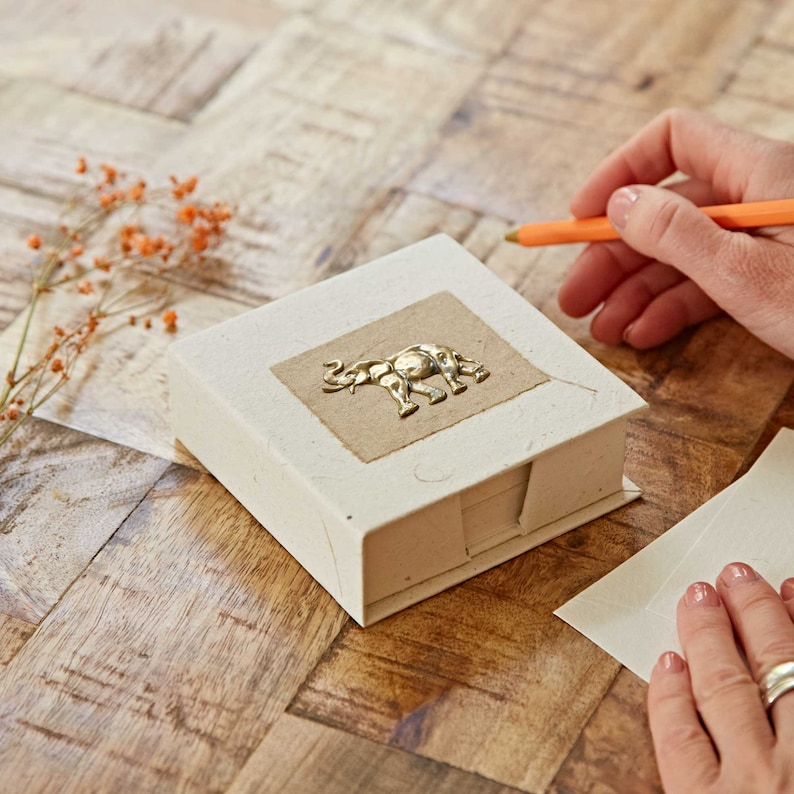
So each notebook has unique flecks, depending on what your elephant friend ate that day! And as the average elephant eats around the same as us chomping down 300 cans of baked beans each day, that’s a lot of dung!
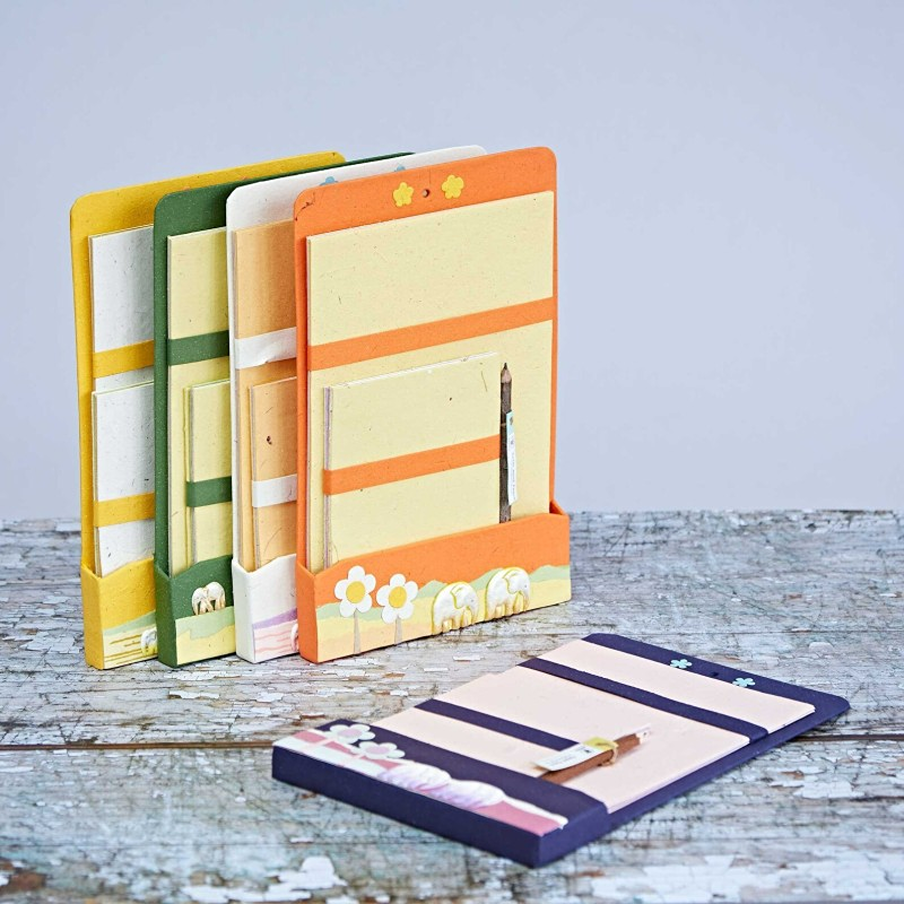
Vent 4 Change (notebooks from from recycled trash)

Vent 4 Change is a company that takes waste materials, and uses them to produce beautiful notebooks. Profits also help to fund children’s education.
Some items are made from recycled leather (we don’t list these, in case it creates a market).
This ocean waste notebook is sustainably made in Europe, with green energy. It has a textured fabric cover and 200 inner pages, with the cover being made from recycled ocean plastic waste (blended with post-consumer waste).

Sucseed A5 notebooks (also in A6 size) are different colours, depending on the kind of waste each notebook is recycled with:
- Coffee Beans
- Cherry Fruits
- Lavender
- Kiwi Fruits

The books contain plain, lined and to-do list pages.
PortWest Recycled Paper Journals (made in Kent)
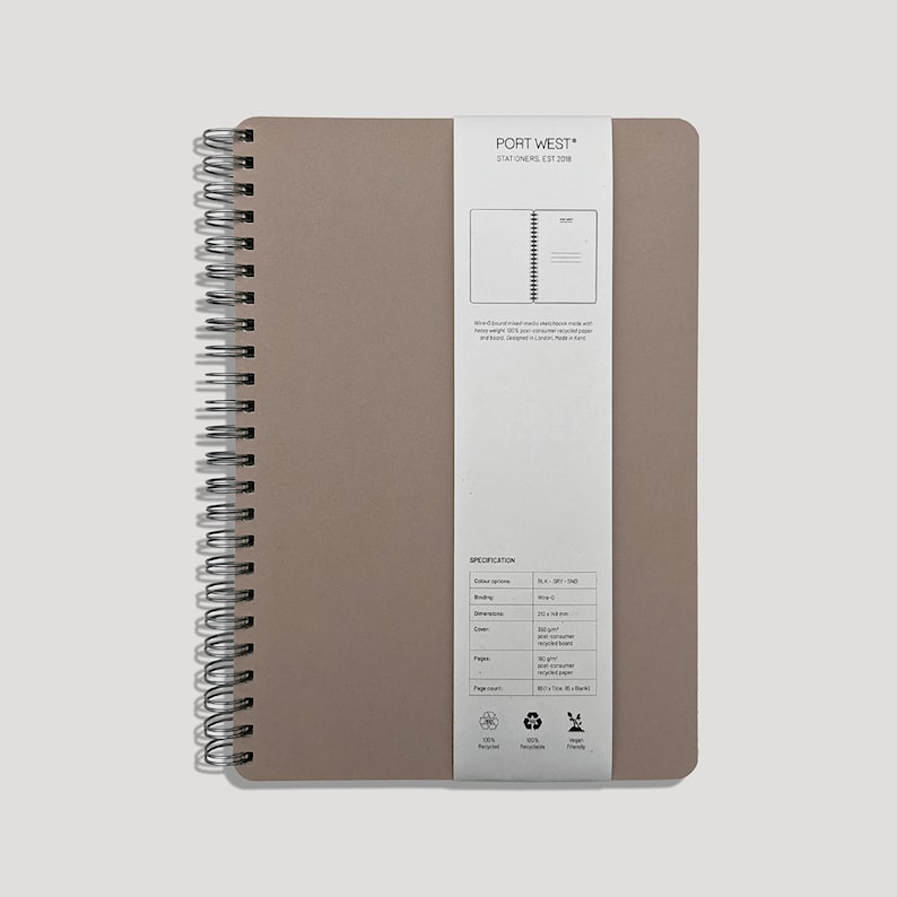
PortWestLDN are A5 journals, made in Kent from a blend of post-consumer recycled paper and upcycled coffee cups, with a handy page marker. Choose from 192 lined or dotted pages. Made using green energy.
The company also offers ‘second’ notebooks for a little discount, due to minor blemishes due to transport or storage (usually little things like faint cover scratches, unevenly rounded corners or the odd print misalignment).
The recycled sketch pads are wire-bound and feature heavy recycled card and inside recycled paper, with non-plastic coated recycled metal wire (85 blank pages).
CoffeeNotes (notepads from old coffee cups!)

CoffeeNotes is a unique company in Dorset, which makes beautiful notebooks. The difference is that they are made from recycled coffee cups. Most disposable coffee cups can’t be recycled, as they contain 5% plastic.
So this company melts down the cups to use the paper for the books, and then uses the plastic as ‘energy’ to make the cups!
All are vegan (bar one pad, made with recycled wool cover).
The to-do list pads are ideal as reminders or for shopping lists. Sold in a pack of three tall pads, each one has 60 tear-off pages with lined tick box sections and dotted sections, and dotted reverse sides.

The wire-bound pads contain dotted pages, and a folded cover so no glue is needed, the spiral spine is easily recycled. Also in plain and lined versions.
The stitched pads have recycled softback covers and the set includes plain, lined and dotted pages.
The planner features a cover made from real coffee waste, and a seven-day layout to plan your week. With blank columns for weekdays, and spaces for tasks and reminders.
Also as an organiser pad with tear-away pages and three flexible spaces for lists, notes and doodles.
Studio Wald: Unique Paper Gifts from Yorkshire

Studio Wald is a unique company, run by a couple who print unique paper goods in Yorkshire, to save trees and give you something interesting to write on!
This pretty A5 notebook contains 48 recycled paper pages, ideal for notes, sketches, lists and doodles. It also has a clever folder to keep the book in, and provide somewhere for extra paperwork.
Designed, printed and finished in Yorkshire, the cover contains a little cotton, and it’s secured with a thick black rubber band closure, packed in a biodegradable corn/potato starch bag.

The gardener’s diary is open-dated, and shows a month to view, with enough pages to last a year. Ideal to make a note of planting dates and garden reminders, and to refer back, when complete.
Before planting, learn about pet-friendly gardens. Avoid facing indoor foliage to gardens, to help stop birds flying into windows.

Recipe Notecards are sold as a set of four blank cards, with vegan vegetable soups on the reverse side of each illustration. Once the card has been used, the recipient can tear the perforated edge, to keep the recipe.
Before cooking, read up on kitchen safety for people and pets.
Another Loop Stationery (miniature artworks!)

Another Loop is a wonderfully original company, founded by two art students. They create unique stationery gifts that are like miniature works of art, far more interesting than the boring fodder you find on the high street.

Everything is designed from scratch in a small studio using hot foil press. For occasions big or small, you are sure to find something to suit. All paper used is FSC-certified and where possible, uses recycled fibres and renewable energy.

As items are printed in small batches, there is no waste. Any offcuts are turned into other products like gift tags. All foil is easy to recycle, and waste foil is sent off, to make into clean energy. Their packaging is not always the prettiest, but that’s because it’s usually recycled too!

Switching to eco friendly pencils is one of the simplest ways to help the planet. Whether you sketch, take notes, or just love a good crossword, these pencils add a happy, green twist to your everyday routine.
This pack of wood-free pencils includes five high quality HB pencils with 2mm nibs, hand-rolled using bright colours of recycled newspaper. The pencils are made by artisans at a social enterprise in Sri Lanka, to give good jobs and income, then sold by a small Fair Trade company in West Sussex.
Pencils are choking hazards, so keep them away from young children and pets. Some plantable ‘seed pencils’ contain wildflowers that are not safe near animal friends. Read our post on pet-friendly gardens.
Never throw pencils on the street. Any litter ends up going down storm drains and into the sea. If you’ve ever accidentally stabbed your hand with a pencil, you can imagine how discarded pens and pencils can harm marine creatures.

Recycled newspaper pencils cut down on waste and save trees. Each box gives old papers a new life, reducing landfill and need for new timber.
Pencils Made from Recycled CD Cases
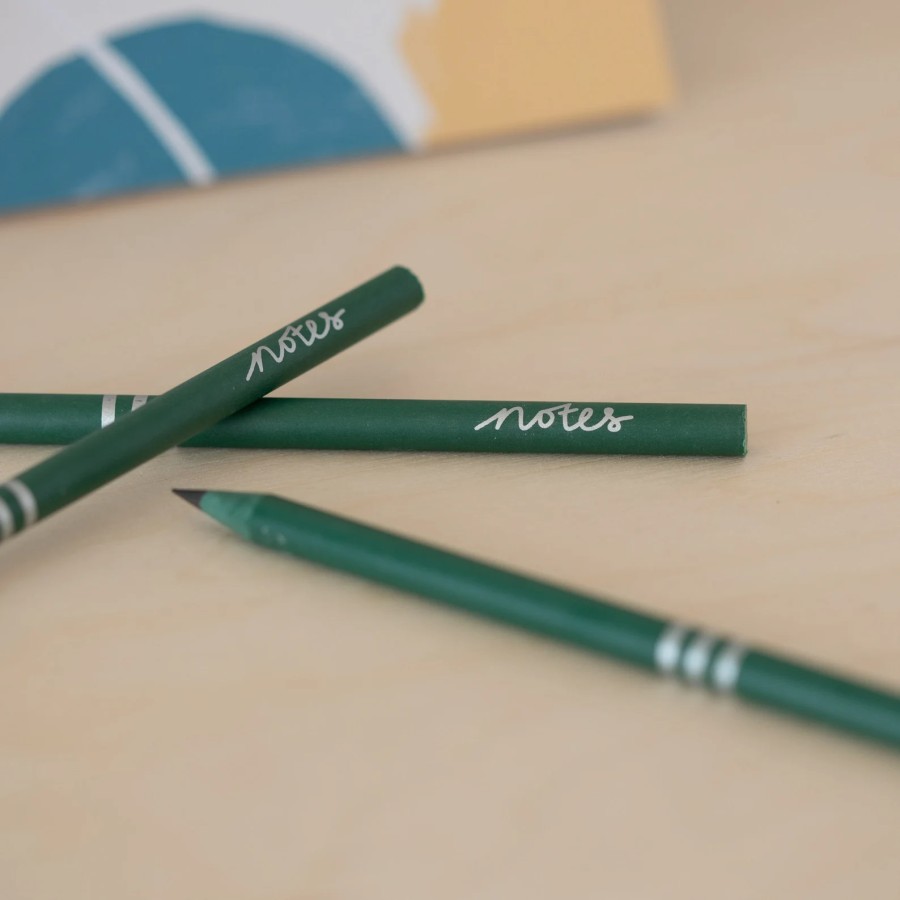
Vent for Change offers pencils that use recycled CD cases for the body, sold in cardboard packaging. Sold in a pack of 3, these are tree-free, yet sharpen like cedarwood pencils. The company does sell some items made from recycled leather (we don’t list these, as it may create a market).
Recycled CD case pencils offer surprising strength. The reclaimed plastic makes the barrel less likely to snap under pressure. You get a pencil that holds up to regular use, whether you’re jotting notes at school or sketching at your desk.
Each pencil reclaims plastic that would otherwise end up in landfill or the ocean. Old CD cases are shredded and processed into new, usable barrels. This keeps single-use plastics in the loop and reduces demand for fresh materials.
A Box of Quality Bamboo Alloy Pencils
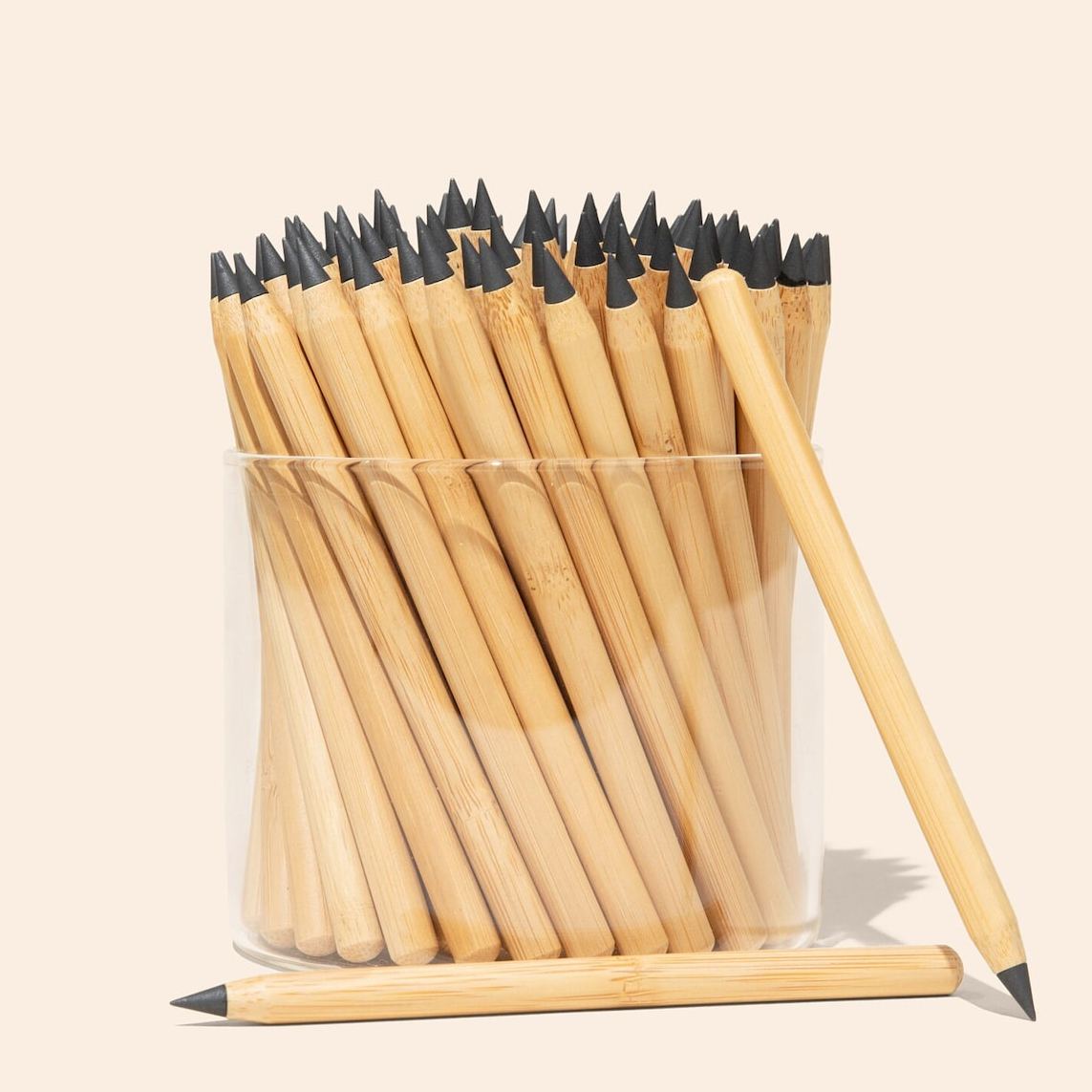
Bamboo (the world’s fastest-growing grass) is not local (it’s usually imported from China). But if sea-freighted, bamboo grows far quicker than wood, so helps to save trees. Industrial bamboo is not the same as fresh shoots, eaten by pandas.
These bamboo alloy pencils ship from the USA, but are expected to last a lifetime. One pack includes 10 pencils (can be erased with a regular eraser, not included). These pencils don’t smudge.
Bamboo pencils are light yet hardy, and have a nice slightly woody scent. Whereas trees take decades to grow and harvest, bamboo plants are back to where they were, within weeks or months of being harvested. So have a far lower carbon footprint.
A Mechanical Pencil (with Refillable Lead)

Some unique pencils are mechanical. So instead of using graphite, they use metal to ‘write’ with pencils that last forever. These pencils are particularly popular with students and engineers.
Tom’s mechanical pencil has solid brass grip, and aluminium body. Sold with refillable leads.
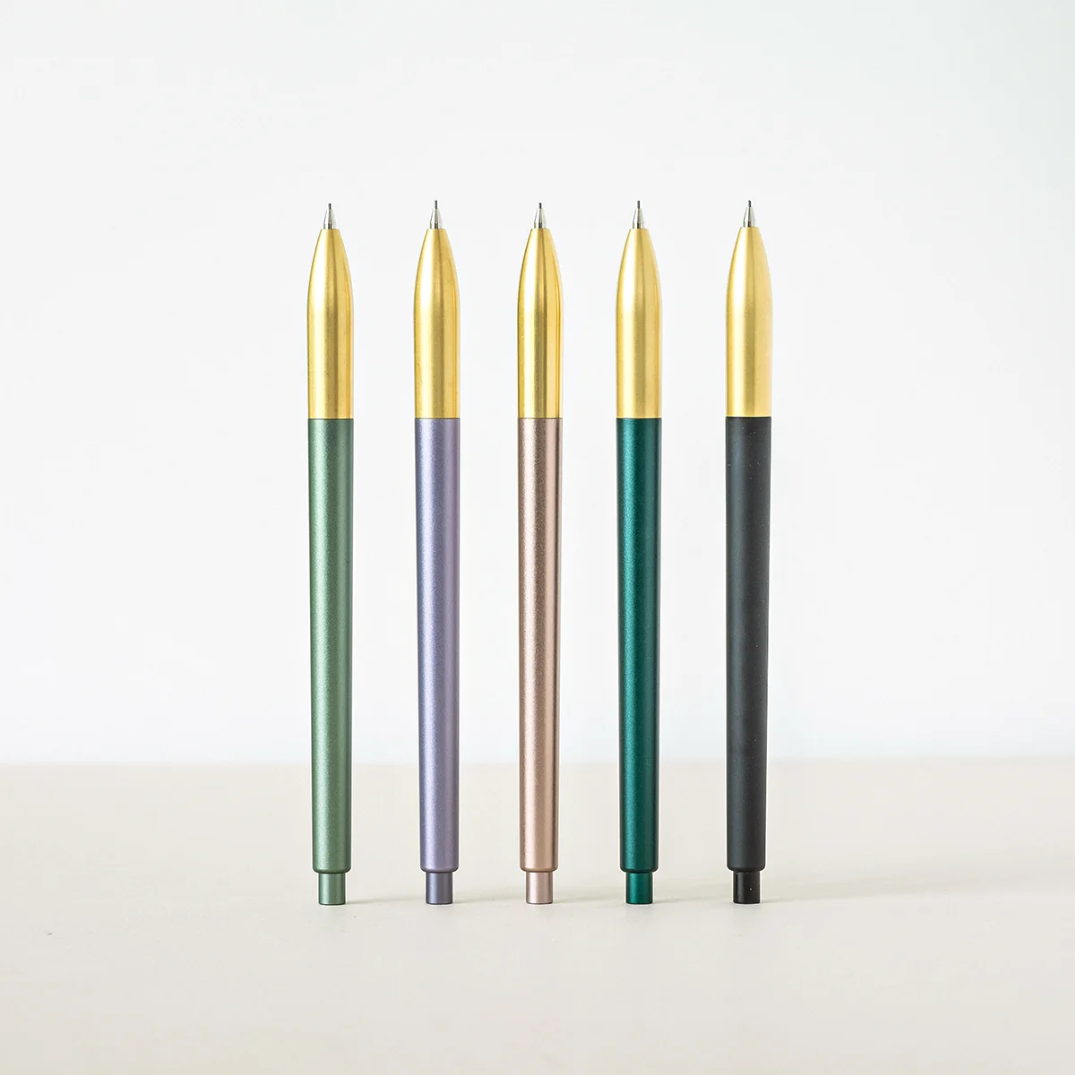
Mechanical pencils save you from endless sharpening and constant replacements. You only need to refill the lead and occasionally replace the eraser.
This means fewer trips to the shop and less waste in your pencil case. Even after months of daily use, your pencil will feel and perform like new.
Pencil Holders (made from recycled newspapers)
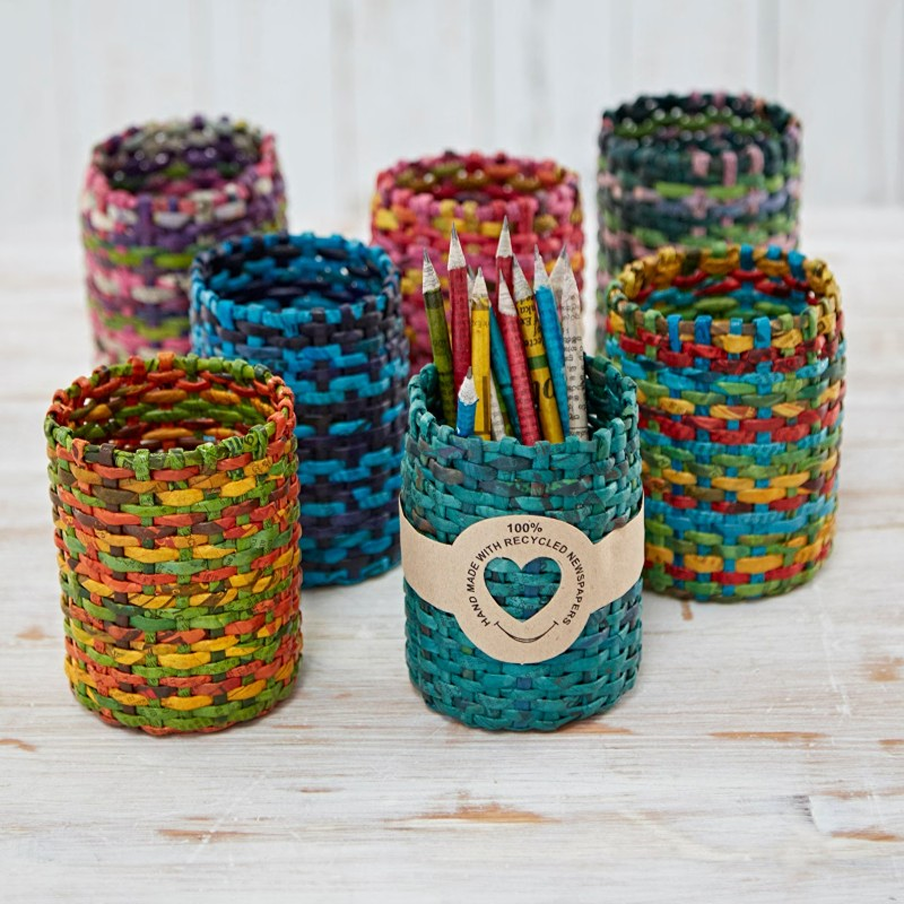
The pencil holders are also randomly unique, but you can ask for a colour theme and they will try to match it to your office. Handmade by a social enterprise in Sri Lanka, these are perfect to stash all your pens and pencils.

It’s true that newspaper breaks down in landfills (unlike plastic). But this still causes methane, a potent greenhouse gas to be released. So making old newspapers into other things, helps to reduce emissions and therefore climate change.

Where to Recycle Plastic Pens and Pencils
Terracycle offers a free writing instruments recycling programme, sponsored by industry. Just order a box for your office, school or community then everyone can deposit unwanted pens, pencils, highlighters, correction fluids, felt-tips pens and erasers.
You can download a poster to display near the recycling box, and all items are sent off to be made into other things (like park benches).
Recycled Newspaper Photo Frames
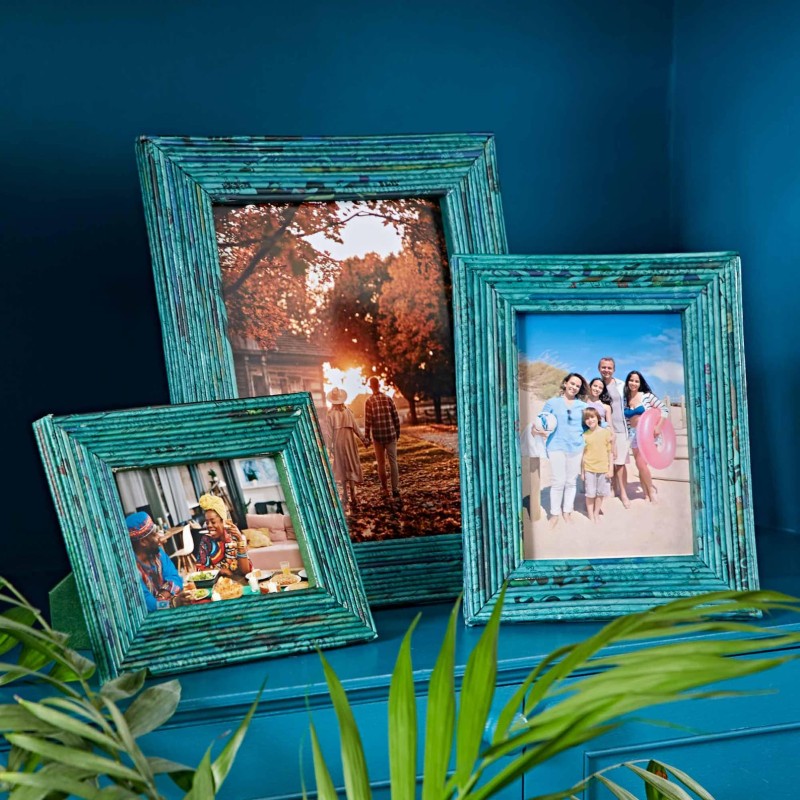
The matching photo frames are in 2 sizes, with an attached stand to place the photos on portrait or landscape or a flat surface. There is no glass/plastic cover, nor fiddly hooks, just slots to slip photos in.
Pencils Pots Made from Recycled Newspaper

These pencil pots made from recycled newspaper (also in round versions) are naturally colourful, and made by artisans in India. They try to match colours with office decor.

Choosing pencil pots made from recycled newspaper cuts down on waste. Newspapers already get tossed away in huge amounts every day. Instead of sending them to landfill, they’re given a new life as handy organisers.
Every recycled newspaper pencil pot looks a bit different, thanks to the mix of headlines, photos, and the original print. You rarely get two that look exactly the same.
Many people think paper won’t last, but these pencil pots are surprisingly strong. Most can handle pens, scissors, and other desk items without bending or breaking. Unlike glass or metal pots, these are lightweight and safe even for children to use. If they drop one, it won’t shatter or dent floors.
Pretty Pencil Cases (made from recycled cotton)

Heart & Parcel is a Hampshire brand of pretty recycled office goods, mostly made from cotton waste from the fashion industry. In various styles, the pencil cases feature quality zips. You can choose from various styles: floral, muted or dark styles, or even geometric shapes and bright colours.
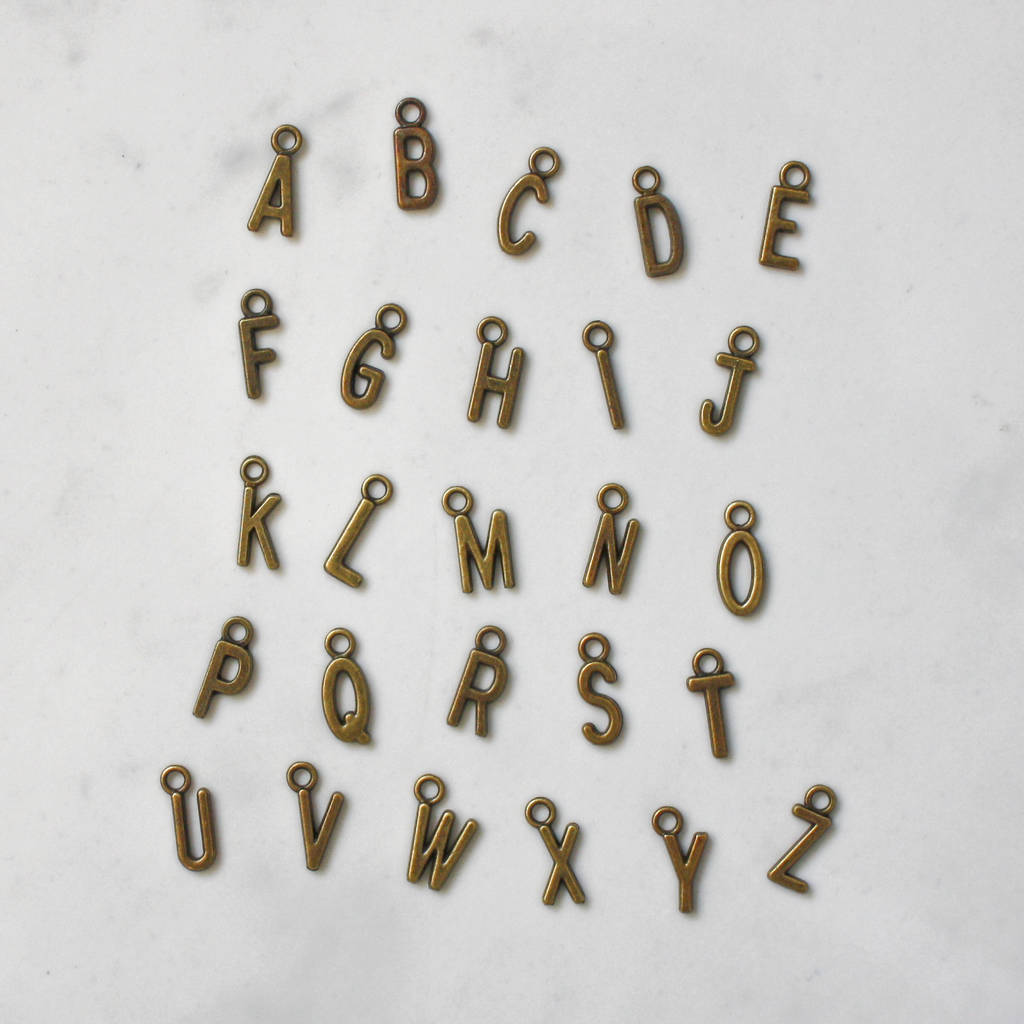
The pencil cases feature feature heavy-duty hand-tied zips, and also work as good make-up bags. Choose your favourite colour and add an initial, if wished. Recycled cotton slashes water use compared to new cotton. Traditional cotton farming soaks up vast amounts of water.

If you work from home, make the effort to create a little office, even in a bedroom or spare room. You can buy desks that fit flush against the wall when not in use (better for your back and neck). Or use a portable laptop stand, which helps keep your bones in alignment, if you work at a kitchen table.
Use desk lamps with lifetime guarantees (these prevent light pollution and offer task lights, to help prevent birds flying into windows – also don’t face indoor foliage to outside gardens).
If you have office plants, know pet-toxic houseplants to avoid (sago palm, lilies etc). And remove if hot-desking with others.
Also read our post on zero waste cables and chargers.

Delphis Eco offers a range of household cleaning products, but also a range for commercial use, in bulk containers. This brand is ideal for use by offices, hotels, restaurants, schools and councils. This is a quality brand that you can use to replace current toxic brands.
Use with plastic-free cloths and sponges. Choose Unscented for pregnancy/nursing and when cleaning near babies or pets (citrus oils are toxic to pets). Never mix vinegar or lemon juice with any bleach (causes toxic gas). For half-full bottles of chemical liquids, don’t pour down drain (dispose of at your local tip).

The range includes:
- Multi-Purpose Cleaner (also in a 2-litre concentrated size)
- Bathroom, Shower & Toilet Cleaners
- Limescale Removers
- Anti-bacterial cleaners and sanitisers
- Glass & Stainless Steel Cleaners
- Eco Drain Cleaners and Maintainers
- Kitchen Cleaners & Degreasers
- Floor & Surface Gel Cleaners
- Non-Scratch Cream Cleaners
- Multi-Surface and Metal Polish#
- X-Factor Stain Remover Spray (for sticky marks, spills & pen marks).
Wrap small amounts of cooking oil (and cream liqueurs like Baileys) in kitchen roll and bin. For larger amounts, use an oil recycling bin to take to the tip, to prevent blocked drains.

The commercial range is in bulk containers for better value, and also includes some unique products for shops, restaurants, hotels and offices. It includes:
- Foaming & Combi Oven Cleaners
- Heavy Duty Toilet & Limescale Remover
- Washroom Cleaner & Urinal Blocks
- Metal Polish
- Chewing Gum Remover
- Natural Salad Wash
- Commercial Hand Soap
- Floor Maintainer (for mops or floor machines)
- Heavy Duty Degreaser
- Scented Air Freshener
- Cabinet Glass Wash
- Masonry & Stone Cleaner
- Waterless Hand Rub
- Low Foam Degreaser
Where to Buy Eco-Friendly Office Furniture
IKEA and many other stores sell leather-free swivel chairs and affordable desks made from sustainable wood. Or go to second-hand stores (there are many online) that offer used office furniture, to stop it going to landfill.
You can buy recycled office furniture from Reyooz. 80% of office furniture goes to landfill or is burned, when most is in good condition. You can donate unwanted office furniture to CollectEco, which passes it onto good causes.
Coggins SOS (Preston, the rainiest place in England) can collect and recycle office furniture, to sell on at low-cost to those who need it. If large council offices buy everything new, that’s money that could be spent on creating walkable communities and free social care etc.
And of course recycling has a much lower carbon footprint, and doesn’t chop down more lovely trees! You’ll also save 50% to 80% of costs. And avoid disposal fees at landfill.
Recycled Furniture is Always Better
As well as being cheaper, it avoids huge amounts of waste at landfill. In the UK, offices throw out around 1.2 million desks and 1.8 million chairs each year. The average cost of landfill disposal of such items is £80 to £120 per ton.
So if you have 10 tons of furniture to dispose of, that’s around £1000 easily in costs. Tougher environmental regulations means you may even have to pay more than that.
Visit this company’s learning centre to find out how to refurbish existing furniture, and how to choose sustainable office furniture, on a small budget. You’ll also find free downloads:
- A smart guide to buying refurbished office furniture
- A furniture refurbishment checklist
- How to fill in landfill clearance forms correctly.
Pretty Office Accessories (from recycled cotton)
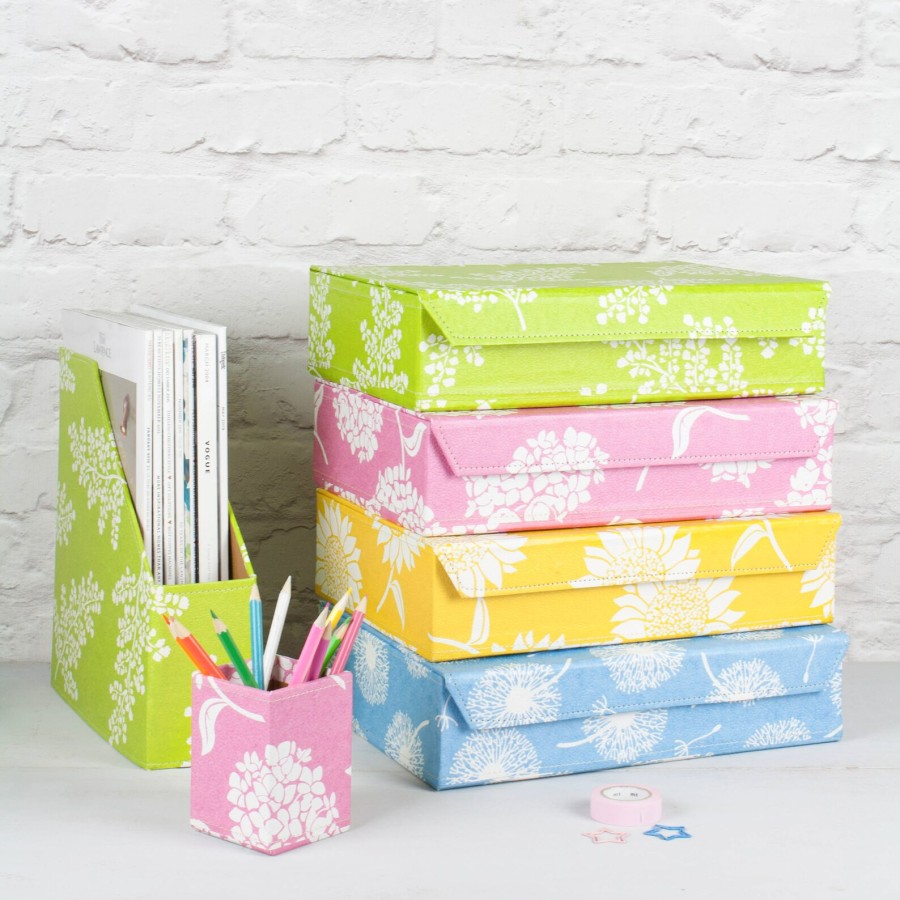
Karenzo & Co is a lovely little company, which produces beautiful office accessories in all kinds of colours and styles (mostly ‘pretty pinks’ but there are also some darker paisley designs for less feminine offices).
Nearly everything is made from offcuts from the fashion industry, helping to upcycle items from one of the most wasteful industries.
The range includes pen holders, waste bins and file folders, along with notebooks made with recycled paper. The designs are screen-printed and finished with plant-based eco dyes and glues.
Hedgerow designs are printed on mulberry paper with images of native birds and florals. Moody Hues features dragonflies, ladybirds, bees and butterflies.
Pencils are choking hazards, so keep them away from young children and pets. Some plantable ‘seed pencils’ contain wildflowers that are not safe near animal friends. Read our post on pet-friendly gardens.
Never throw pencils on the street. Any litter ends up going down storm drains and into the sea. If you’ve ever accidentally stabbed your hand with a pencil, you can imagine how discarded pens and pencils can harm marine creatures.
Where to Recycle Plastic Pens and Pencils
Terracycle offers a free writing instruments recycling programme, sponsored by industry. Just order a box for your office, school or community then everyone can deposit unwanted pens, pencils, highlighters, correction fluids, felt-tips pens and erasers.
You can download a poster to display near the recycling box, and all items are sent off to be made into other things (like park benches).
Muggi Office Cup Holders (made from fishing waste)

Muggi makes cup holders sold with an 88-year guarantee! Perfect for offices, they are also good for caravans and boats (sturdy and comfortable, to keep drinks save on choppy waves).
Ghost fishing gear makes up 10% of ocean waste, killing hundreds of thousands of marine creatures. Volunteer to help remove ghost fishing waste.
This simple invention is just great! The inventor has ensured that older and disabled people can use it (including people with cerebral palsy, to avoid dangerous spills).
It’s sold worldwide, and one of those ‘aha’ inventions that could not only help to use up the mountains of collected fishing waste, but keep people safe from burns.
We like Sanctuary Coffee (profits help animal sanctuaries!) NHS says that it’s best to avoid caffeine for pregnancy/nursing (or no more than 2 cups of weak tea daily – or 1 cup of mild coffee or cola). Also avoid caffeine for certain medical conditions.
Millions of disposable coffee cups are thrown away daily, the paper is lined with microplastics, and littered sweet caramel liquids with caffeine and xylitol can harm dogs and wildlife.
Anglepoise Desk Lamps (with lifetime guarantees)

Anglepoise is a Portsmouth brand of desk lamps (around since 1932) that are quite pricey, but designed to last forever – indeed, each one is sold with a lifetime guarantee. An ideal investment for your office. Use with energy-efficient light bulbs.
Desk lamps are good for task lighting, especially in the evening with blinds pulled down. Combined near glass, this helps to stop birds flying into windows. Also never display indoor plants, to face outdoor gardens.
The Type 75 is a smart choice if you want a compact, tidy lamp that suits modern desks and daily work. Its footprint is small, yet the reach and articulation are generous, so you can pull the light in close for detail or push it back to wash a wider area. It works well with energy saving LED bulbs.
Care is simple. Wipe the lamp with a soft, dry cloth. If needed, a slightly damp cloth works for tougher marks. Avoid harsh chemicals, abrasives, or solvent cleaners that can damage paint, chrome, or brass detailing. Keep the cable untwisted and check the plug and switch for signs of wear.
A Portable Bamboo Laptop Stand (prevent bad necks!)
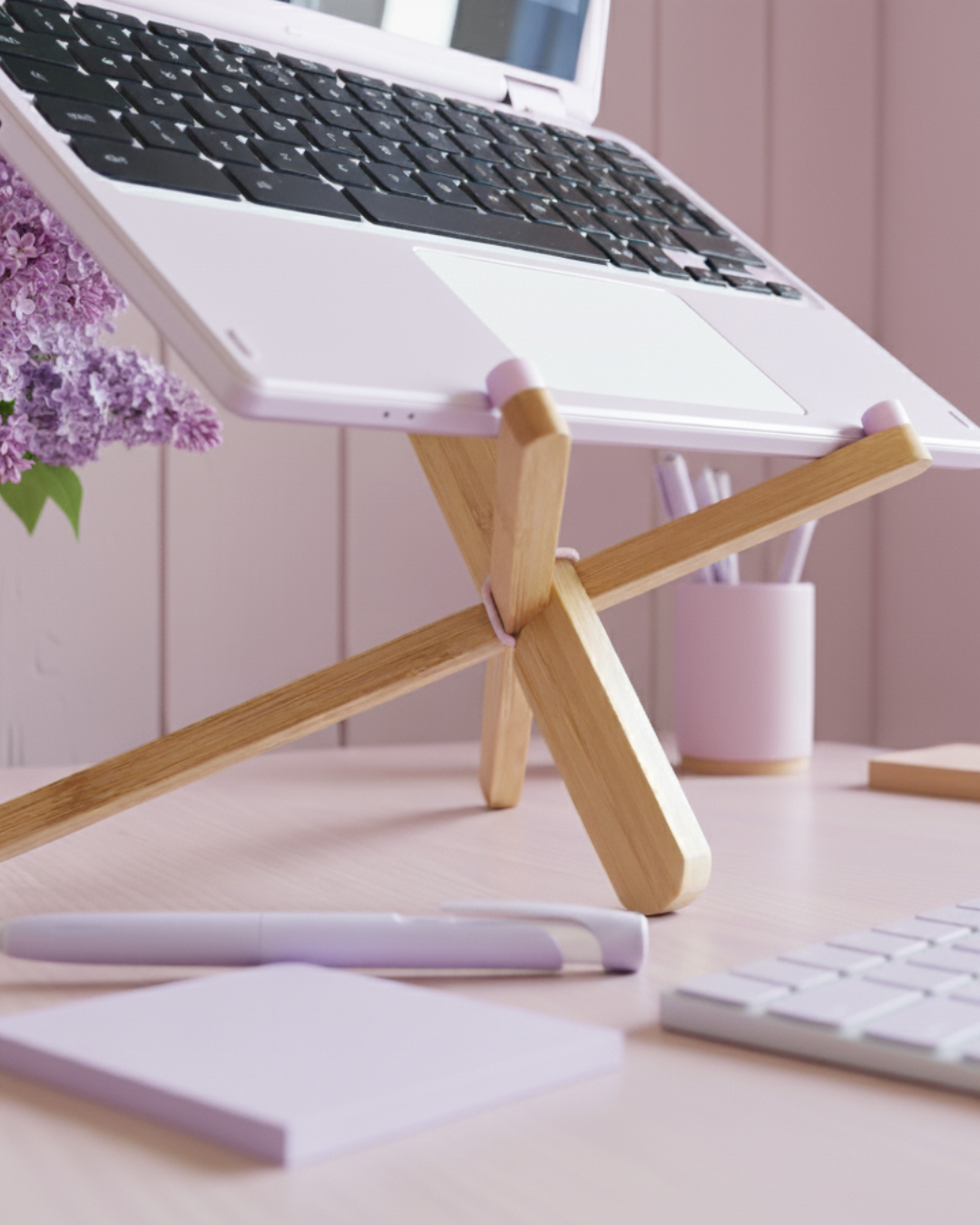
If you work from home or on-the-move but don’t have access to a proper desk with ergonomic chair, it’s likely that sometimes you get an achy neck or back, from leaning over at the wrong angles.
Dragonfly Laptop Stand is made from eco-friendly bamboo, and is designed to ensure you sit with your posture in the correct position, so you can work safely without aches and pains. It basically eliminates ‘laptop hunch’ which we all do when we’re working from a sofa, by providing better spinal alignment. And raising your ‘eye to screen’ level.
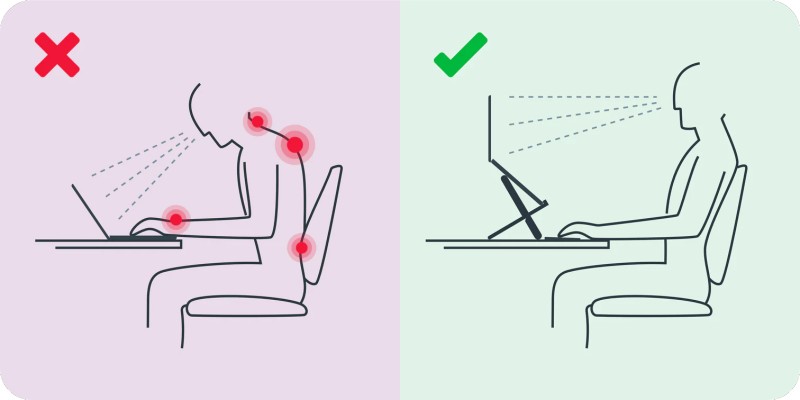
It’s also idea if you work on a train or a coffee shop, and is perfect for digital nomads. By eliminating the 60-degree neck flex (common with laptop use), this also reduces pressure on cervical vertebrae and shoulder muscles, which causes discomfort when hunched over a computer.
Helps Prevent Laptop Overheating
The Dragonfly stand also improves airflow around your device. This prevents thermal throttling, extends laptop lifespan and can also help to prevent ‘toasted skin syndrome’ if your face gets hot from working on laptops.
Made responsibly by a small European firm, set-up takes seconds. It accommodates most laptops including MacBooks and ThinkPads. It is designed to be compatible with a computer mouse, and is sold in 5 colour options.
It’s not recommended for use on soft surfaces like beds or couches or soft uneven surfaces (it’s not good anyway to use warm laptops on these, as a fire risk due to hot air underneath.


